The Texas Center for Justice and Equity – formerly the Texas Criminal Justice Coalition – is proud and grateful to work alongside so many individuals and organizations committed to ending mass incarceration and building safe, thriving communities. We must also thank our funders and donors for their generous support of our work. Our successes – and the state’s reform progress – would not be possible without these contributions.
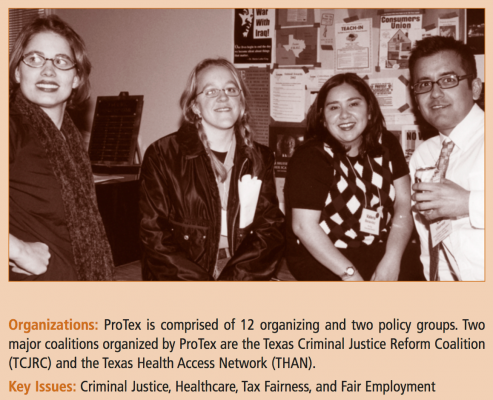
2000-2002: Establishment of ProTex & TCJRC Coordinating Efforts
ProTex: Network for a Progressive Texas is officially established in Austin, in response to a growing need to coordinate the efforts of advocacy organizations seeking systemic change in various policy areas throughout Texas.
One of ProTex’s strongest programs is its criminal justice program, then called the Texas Criminal Justice Reform Coalition (TCJRC), which seeks to challenge mass in...Read more
2000-2002: Establishment of ProTex & TCJRC Coordinating Efforts
ProTex: Network for a Progressive Texas is officially established in Austin, in response to a growing need to coordinate the efforts of advocacy organizations seeking systemic change in various policy areas throughout Texas.
One of ProTex’s strongest programs is its criminal justice program, then called the Texas Criminal Justice Reform Coalition (TCJRC), which seeks to challenge mass incarceration and other tough-on-crime measures, after Texas had gone on a prison-building binge over the prior decades.
TCJRC is helmed by Executive Director Eva Dee Owens [second from left], who is backed by a Board of Directors comprised of advocates committed to ending mass incarceration (and who still in 2020 remain champions for reform!).
Photo credit: Applied Research Center
Read less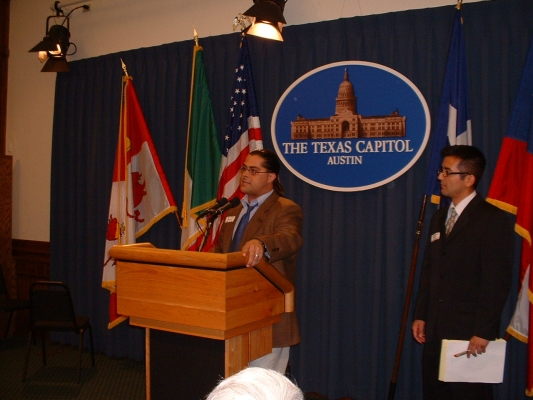
2003: Budget Crisis & Fight for Smart-On-Crime Reforms
Data projections show that the demand for prison space will exceed operational capacity by 2004. Despite such alarming predictions, the Legislature – facing a $10 billion budget shortfall – signals cuts to probation, parole, and diversion programming. In response, TCJC begins to emphasize the need for a smart-on-crime – versus tough-on-crime – approach, among other things successfully supporting measures t...Read more
2003: Budget Crisis & Fight for Smart-On-Crime Reforms
Data projections show that the demand for prison space will exceed operational capacity by 2004. Despite such alarming predictions, the Legislature – facing a $10 billion budget shortfall – signals cuts to probation, parole, and diversion programming. In response, TCJC begins to emphasize the need for a smart-on-crime – versus tough-on-crime – approach, among other things successfully supporting measures that require probation and treatment (vs. costly incarceration) for individuals with first-time, less-than-a-gram possession offenses, and require the Parole Board to annually reconsider people with nonviolent offenses for parole.
Yet still, devastating cuts to state agencies drive more people into prison – including individuals with lower-risk offenses, as well as those who suffer from substance use disorder and mental health problems.
Read less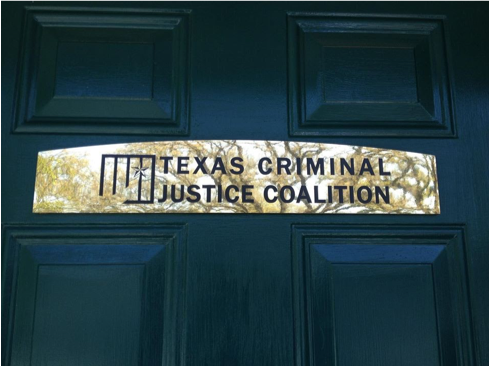
2004: The Texas Criminal Justice Coalition Takes Shape
ProTex closes its doors, but, seeing a continuing need for connection between advocates and organizations working to advance justice reform, the Coalition takes over ProTex’s nonprofit status. Now called the Texas Criminal Justice Coalition (TCJC), the organization assumes a more active role in justice reform, specifically through policy research, public education, and advocacy efforts.
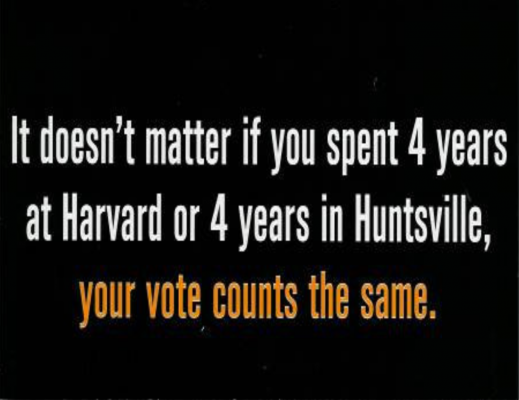
2004-2005: Unlock Your Vote!
TCJC oversees an Unlock Your Vote! campaign with various partners, seeking to educate and empower system-impacted people to become effective advocates for themselves and their communities. We identify formerly incarcerated people, disseminate voter registration cards and work with voter registrars to submit information, work with the Secretary of Stat...Read more
2004-2005: Unlock Your Vote!
TCJC oversees an Unlock Your Vote! campaign with various partners, seeking to educate and empower system-impacted people to become effective advocates for themselves and their communities. We identify formerly incarcerated people, disseminate voter registration cards and work with voter registrars to submit information, work with the Secretary of State’s office to update and distribute training manuals, and create a dedicated website with resources and information. Ultimately, more than 10,000 people register to vote.
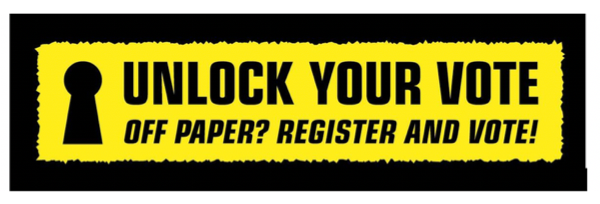

2004-2008: Sole State Repository on Racial Profiling Data
In 2001, the Governor signed a law requiring Texas law enforcement agencies to develop policies on racial profiling, and compile annual reports on who they stop and search, by race.
In 2003 and 2004, TCJRC partners with Texas LULAC, Texas NAACP, and ACLU of Texas to organize 12 town halls th...Read more
2004-2008: Sole State Repository on Racial Profiling Data
In 2001, the Governor signed a law requiring Texas law enforcement agencies to develop policies on racial profiling, and compile annual reports on who they stop and search, by race.
In 2003 and 2004, TCJRC partners with Texas LULAC, Texas NAACP, and ACLU of Texas to organize 12 town halls throughout the state to discuss racial profiling and the War on Drug.
From 2004 to 2008, TCJC is the only entity in the state compiling, analyzing, and producing reports on racial profiling data from Texas law enforcement agencies. TCJC also produces a reporting template used by hundreds of departments, and staff become certified to teach required racial profiling-related courses to law enforcement.
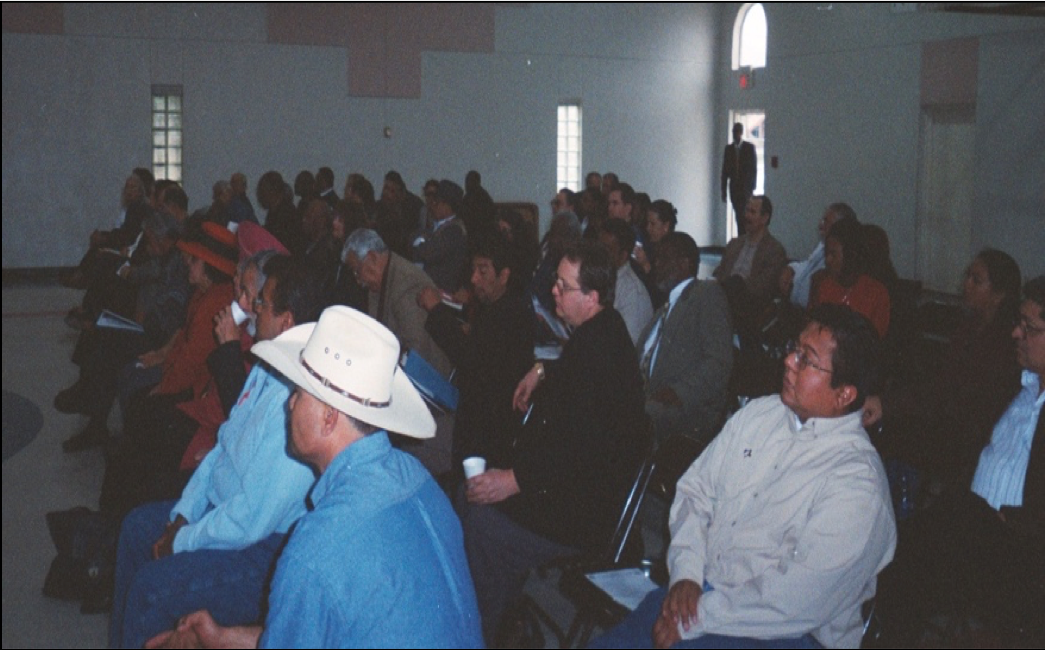
Photo: San Antonio Town Hall
Additionally, TCJC assists in the production of a report on police in college communities, which is commissioned by the Texas NAACP Youth and College Division, and the Thurgood Marshall Legal Society at the University of Texas School of Law. The report is developed in conjunction with the Campaign to End Racial Profiling, a joint project of TCJC, the ACLU of Texas, the League of United Latin American Citizens of Texas (LULAC), and the Texas State Conference of NAACP Branches.
In 2009, state legislation establishes an independent statewide repository for law enforcement racial profiling reports at a state agency, the Texas Commission on Law Enforcement Officer Standards and Education (TCLEOSE), now called the Texas Commission on Law Enforcement.
Read less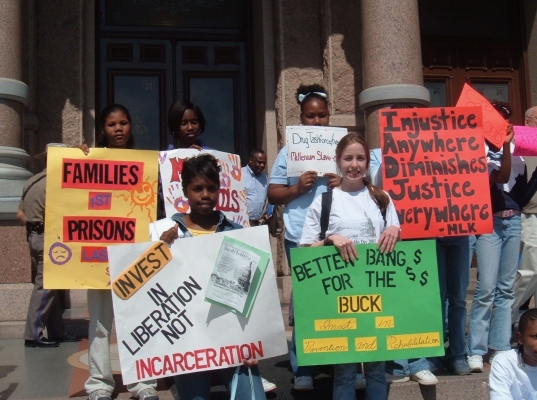
As prison populations rise, TCJC urges the mass mobilization of people advocating for smart-on-crime reforms, resulting in the passage of policies that increase accountability for drug task forces and increase accessibility to identification cards for previously incarcerated indivi...Read more
As prison populations rise, TCJC urges the mass mobilization of people advocating for smart-on-crime reforms, resulting in the passage of policies that increase accountability for drug task forces and increase accessibility to identification cards for previously incarcerated individuals, while also allocating $60 million in new funding for treatment and other alternatives to incarceration in Texas – the first increase in this funding in over a decade.
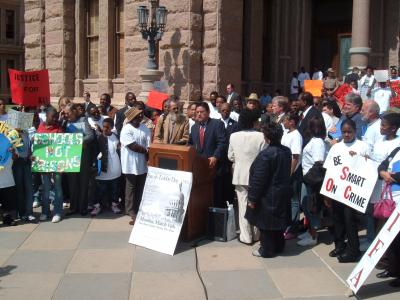

Following a successful legislative session as the Director of TCJC’s Solutions for Sentencing & Incarceration Project, Ana Yáñez-Correa becomes TCJC’s new Executive Director. She will remain in the role for a decade, tirelessly fighting for reform and building TCJC’s capacity to do so.

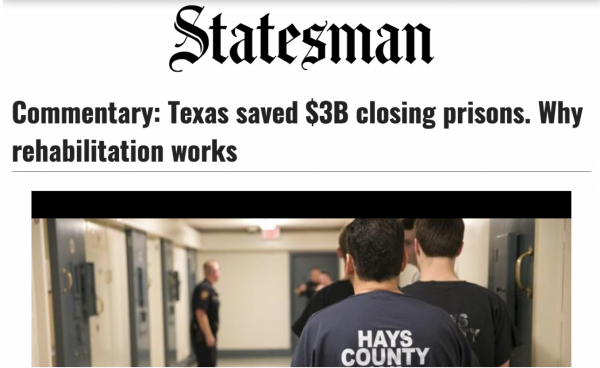
2007: Shifts Towards A Smarter Funding Approach & Indigent Defense Wins
DECARCERATION: Given cuts to critical programs and services in 2003, Texas’ prison system ultimately reaches a breaking point. Mirroring advocate’s dire predictions, the state’s Legislative Budget Board projects the need for another 17,000...Read more
2007: Shifts Towards A Smarter Funding Approach & Indigent Defense Wins
DECARCERATION: Given cuts to critical programs and services in 2003, Texas’ prison system ultimately reaches a breaking point. Mirroring advocate’s dire predictions, the state’s Legislative Budget Board projects the need for another 17,000 prison beds by 2012 if Texas’ pace of incarceration continues. The price tag: $2.63 billion over five years on new prison construction and operations.
TCJC bolsters the efforts of a small group of legislators seeking to staunch the flow of people into prison, educating members of appropriations committees about smarter alternatives, and partnering with probation leaders seeking more funding for community-based services. Ultimately, the Legislature chooses to reinvest $241 million in treatment and diversion programs, restoring funding for many programs cut to zero in 2003 and allowing for hundreds of new drug treatment beds.
At the same time, the Legislature passes bills to shorten probation terms from 10 to 5 years for certain offenses, prevent probationers from being revoked for indigency, encourage the use of progressive sanctions, allow law enforcement to cite and release (rather than arrest) people for certain misdemeanor offenses, and allow judges to place individuals with low-level drug possession offenses on probation if a previous state jail felony conviction for possession was reduced to a Class A misdemeanor.
Over the coming years, Texas’ prison population falls, and the state serves as a model for other conservative states seeking to safely reduce incarcerated populations.
INDIGENT DEFENSE: TCJC separately engages in a massive public education campaign to garner support for a policy that ensures that defendants facing jail time (1) understand they have the right to an attorney, (2) have an opportunity to request the assistance of an attorney prior to talking to a prosecutor, and (3) have the option of seeking an attorney on their own, without losing the opportunity to request appointed counsel, if they cannot afford to hire an attorney.
This follows our work with partners to create a website for individual indigent defense complaints from across the state – an intake system for defendants to share their complaints about practices that pressure them to speak to prosecutors and accept unfair plea agreements before they are able to speak to a defense lawyer.

DIRECTOR HONORED: Executive Director Ana Yáñez-Correa is formally honored by the Texas Legislature through an official resolution that recognizes TCJC’s research and policy analysis efforts.
Read less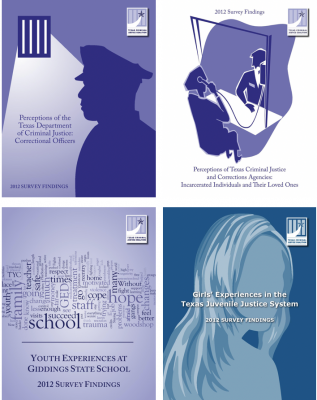
2008-2012: Surveys of Justice System Practitioners and Impacted People
Over a 5-year period, in response to various legislative studies into agencies and justice system-related practices, TCJC conducts over a dozen surveys to inform our advocacy, legislative policy-making, agency administration, and local budget conversations.
Specifically, we survey approximately: 250 Read more
2008-2012: Surveys of Justice System Practitioners and Impacted People
Over a 5-year period, in response to various legislative studies into agencies and justice system-related practices, TCJC conducts over a dozen surveys to inform our advocacy, legislative policy-making, agency administration, and local budget conversations.
Specifically, we survey approximately: 250 judges about substance use and mental health placement [2008]; 200 service providers about substance abuse service coordination, availability, and provision [2008]; 250 reentry practitioners about prisoner re-entry challenges in Texas [2008]; 70 sheriffs, county court judges, jail and administrators about the mission and performance of the Texas Commission on Jail Standards [2008]; 60 probation directors about treatment and programming options available for probationers [2010]; 650 reentry providers about challenges facing them in both rural and urban communities [2010]; nearly 280 parole officers and 275 parolees about the parole system and related challenges [2012]; 60 correctional officers on conditions in the state prison system [2012]; 40 pretrial personnel and probation directors on the state of pretrial services in Texas [2012]; 115 boys at the Giddings youth prison and 50 girls at the Ron Jackson State Juvenile Correctional Complex about their experiences in the youth justice system [2012]; 75 county juvenile probation chiefs about funding levels and other needs in the field [2012]; and 400 incarcerated individuals and 70 loved ones in regards to functions of the Texas Department of Criminal Justice, including unit administration, safety, conditions of confinement, physical and mental health, programs, and reentry and parole [2012].
Read less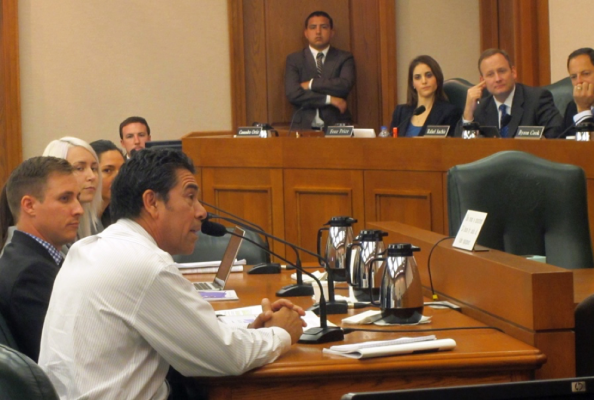
2009-2013: Significant Reentry Reforms
TCJC makes a meaningful push for policies that will help people safely return to their communities. Ultimately, the Legislature passes historic reentry reforms that establish the state’s Reentry Task Force, limit employer liabi...Read more
2009-2013: Significant Reentry Reforms
TCJC makes a meaningful push for policies that will help people safely return to their communities. Ultimately, the Legislature passes historic reentry reforms that establish the state’s Reentry Task Force, limit employer liability on charges of negligently hiring or failing to adequately supervise an employee who has a criminal conviction, require creation a comprehensive reentry and reintegration plan for people leaving the state prison system, and establish a housing voucher program for people on parole.
As a member of the employment workgroup of the state’s Reentry Task Force, TCJC urges the establishment of an administrative policy that allows formerly incarcerated individuals to be able to list their “industry” prison employer on their resumes. The workgroup also helps facilitate a confidential portal – called Website to Work – where employers can provide the qualifications/skills needed for open positions and can be matched with people going through the reentry process.

Photo credit: The Huntsville Item
Read less
2010-2013: Maintained Fight for Smarter Reforms & Historic Prison Closure
In 2010, Texas faces another budget shortfall, estimated at approximately $28 billion – much greater than the deficit faced in 2003. TCJC urges legislators to maintain funding for treatment and diversion programs, warning that that cuts will sweep away three biennium’s worth of work that the Legislature had a...Read more
2010-2013: Maintained Fight for Smarter Reforms & Historic Prison Closure
In 2010, Texas faces another budget shortfall, estimated at approximately $28 billion – much greater than the deficit faced in 2003. TCJC urges legislators to maintain funding for treatment and diversion programs, warning that that cuts will sweep away three biennium’s worth of work that the Legislature had accomplished.
To build support for reforms during the coming state legislative sessions, we hold a rally and march with Texas Forward and our justice reform partners in Austin, which brings together hundreds of individuals seeking smart investments [photos at left].
We also release a series of reports. One includes over 60 recommendations to reduce county jail populations; the Texas Association of Counties disseminates to all sheriffs, county judges, and commissioners in its base. Another report offers more effective approaches to drug crimes. And a third report, created in response to the legislative “Sunset” review of the state corrections system, offers nearly 90 recommendations for use by Sunset staff and members, agency heads, and policy-makers.
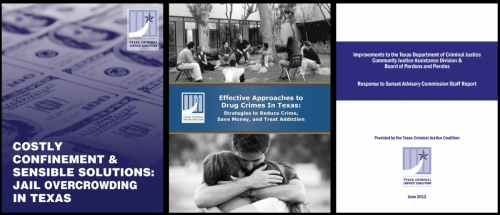
Across the 2011 and 2013 sessions, TCJC successfully drives support for legislative reforms and budget allocations that will safely reduce incarceration:
- Bills incentivize probationers to participate in self-improvement programming through the use of time credit incentives, limit the circumstances in which a state jail felony offense can be enhanced to a third degree felony, enable a county or region to create a prostitution prevention/diversion program, allow the use of diligent participation credits for those who complete programming while in state jails, and allow certain individuals to be issued a summons, rather than serve jail time, while awaiting a parole revocation hearing.
- The Legislature boosts investments in probation and community-based programs, and in 2013, the state budget includes Rider 64, “Close Private Prisons,” which requires the corrections system to reduce correctional facility bed capacity to contain costs as they pertain to “Contract Prisons and Privately Operated State Jails,” and “Residential Pre-Parole Facilities.”
By 2011, Texas closes its first state prison, the Central Unit in Sugar Land, Texas, a landmark win reflecting the impact of decarceration reforms that TCJC and our partners have long pushed. In 2013, state officials approve the additional closure of two private facilities, Dawson State Jail and Mineral Wells Pre-Parole Transfer Facility, marking a continued shift in attitude among Texas leadership amidst falling crime rates and better evidence of alternatives.
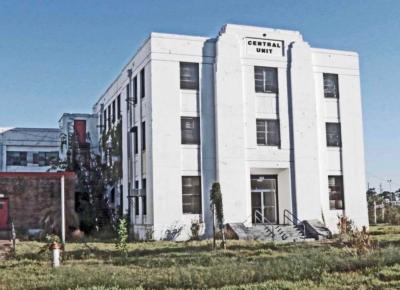
[Photo credit: Kristi Nix, Houston Chronicle]
The state also closes additional youth facilities – West Texas and Victory Field in 2010; Al Price, Crockett, and Ron Jackson II in 2011; and Corsicana in 2013 – and consolidated two McLennan County facilities. Only five youth prisons remain.
Read less
2011: TCJC Expansion to Houston
TCJC expands our staff to Harris County (Houston), Texas’ largest county and its largest driver of people into the youth and adult justice systems.
COMMUNITY RECONCILIATION: TCJC’s early efforts involve building a working unity among Black and immigrant communities in Houston, resulting in groups standing in solidarity on pressing struggles, and a Read more
2011: TCJC Expansion to Houston
TCJC expands our staff to Harris County (Houston), Texas’ largest county and its largest driver of people into the youth and adult justice systems.
COMMUNITY RECONCILIATION: TCJC’s early efforts involve building a working unity among Black and immigrant communities in Houston, resulting in groups standing in solidarity on pressing struggles, and a report calling for restoring community trust and improving public safety.

SUPPORT FOR THE PUBLIC DEFENDER’S OFFICE: TCJC long fought for the establishment of the Harris County Public Defender’s Office, which was approved in 2010; we urged the County Commissioners Court to support such an office and provided input on the county’s proposal.


2011-2014: Support for the New Texas Association of Pretrial Services
TCJC works with the Pretrial Justice Institute and Travis County Pretrial Services to improve the status of Texas’ pretrial programs and the pretrial release process generally by forming an official statewide organization, the Texas Association of Pretrial Services(TAPS), based out of the George J. Beto Criminal Justice Center at Sam Houston Stat...Read more
2011-2014: Support for the New Texas Association of Pretrial Services
TCJC works with the Pretrial Justice Institute and Travis County Pretrial Services to improve the status of Texas’ pretrial programs and the pretrial release process generally by forming an official statewide organization, the Texas Association of Pretrial Services(TAPS), based out of the George J. Beto Criminal Justice Center at Sam Houston State University in Huntsville, Texas.
The Association establishes various working groups; TCJC is a member of the Legislative Policy group, and we develop specific pretrial-related policy recommendations for dissemination to the Association, for use in their members’ advocacy efforts. TAPS holds its first annual conference in 2014, which TCJC helps plan and offers sponsorships for.

Conference photo credit: Texas Association of Pretrial Services
Read less
2014: Establishment of the Texas Smart-On-Crime Coalition & Meadows Mental Health Policy Institute
TCJC co-founds the Texas Smart-On-Crime Coalition, the largest statewide effort working to make Texas’ justice system smarter, safer, and more cost effective. The Smart-On-Crime Coalition brings together businesses, faith organizations, nonprofit organizations, and the state’s most prominent conservative and progre...Read more
2014: Establishment of the Texas Smart-On-Crime Coalition & Meadows Mental Health Policy Institute
TCJC co-founds the Texas Smart-On-Crime Coalition, the largest statewide effort working to make Texas’ justice system smarter, safer, and more cost effective. The Smart-On-Crime Coalition brings together businesses, faith organizations, nonprofit organizations, and the state’s most prominent conservative and progressive organizations to pursue bipartisan plans to address, reduce, and prevent crime. At the Coalition’s launch, Ana Yáñez-Correa states, ““Together, we will fight for a stronger and safer Texas, where each community member has the tools to live responsibly.”
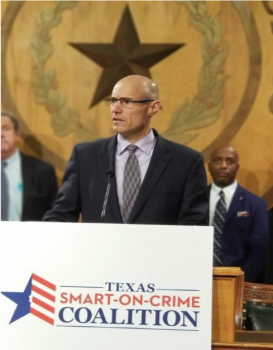
TCJC also participates in the Planning Committee for the to-be-launched Meadows Mental Health Policy Institute for Texas. Throughout 2013, TCJC and others work with The Meadows Foundation to assess the need for an institute to conduct policy research and provide policy analysis and recommendations intended to improve Texas’ public mental health system. The Institute becomes fully operational in 2014, kicking off with a “Texas State of Mind” conference in Austin.
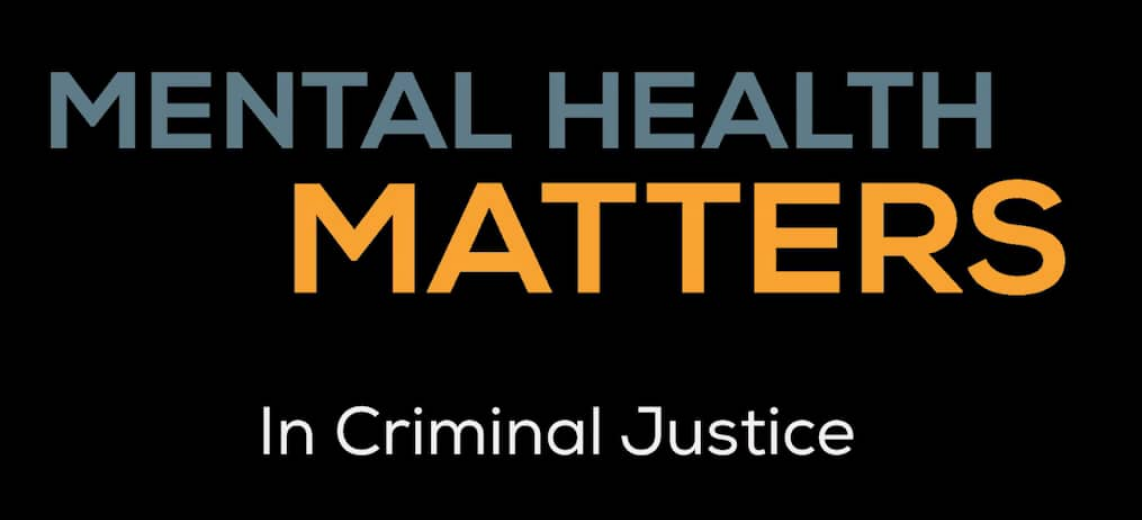

2014: Harvard’s Executive Session on Community Corrections
Dr. Ana Yáñez-Correa and approximately 30 others from throughout the country are invited to participate in the Harvard Kennedy School’s Executive Session on Community Corrections, which is convening over the next 3 years. The objective is...Read more
2014: Harvard’s Executive Session on Community Corrections
Dr. Ana Yáñez-Correa and approximately 30 others from throughout the country are invited to participate in the Harvard Kennedy School’s Executive Session on Community Corrections, which is convening over the next 3 years. The objective is to identify and develop best practice strategies in community corrections, which could inform public safety and criminal justice in the United States for years to come. As the only Latina/immigrant participant, Dr. Yáñez-Correa is proud to bring her perspective to the table.
Photo credit: Harvard Kennedy School
Read less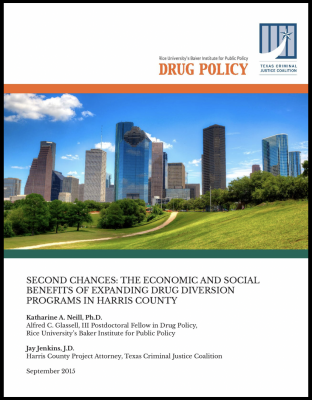
2014-2015: Drug Reform & Less Incarceration in Houston
DECARCERATION: TCJC successfully advocates for the First Chance Intervention Program (FCIP) in Harris County (Houston), which permits certain law enforcement agencies to divert individuals with Class B marijuana possession offenses into classes or programming.
In 2015, we co-publish a Read more
2014-2015: Drug Reform & Less Incarceration in Houston
DECARCERATION: TCJC successfully advocates for the First Chance Intervention Program (FCIP) in Harris County (Houston), which permits certain law enforcement agencies to divert individuals with Class B marijuana possession offenses into classes or programming.
In 2015, we co-publish a report with the Baker Institute at Rice University that examines ways in which drug policy outcomes can be improved in Harris County through wider implementation of the FCIP. The Houston Chronicle follows up with an editorial echoing our arguments and citing our report.
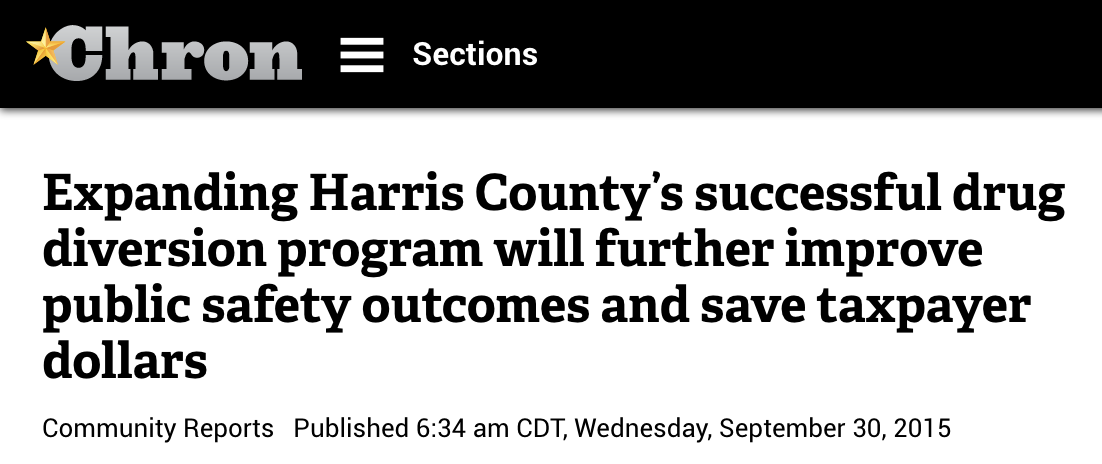
In late 2015, the District Attorney extends the FCIP to all law enforcement agencies in Harris County. Also importantly, the DA’s vocal message that marijuana is a low-level, nonviolent offense provides her with the opportunity to expand the program to first-time shoplifting arrests.
REFORM BLUEPRINT: Also in 2015, TCJC works with partners to develop a blueprint for criminal justice policy solutions in Harris County. Note: The blueprint serves as the template for the county’s successful 2016 application to the MacArthur Foundation for a Safety and Justice Challenge grant, which results in the county receiving $2 million over three years to reduce its average daily jail population.
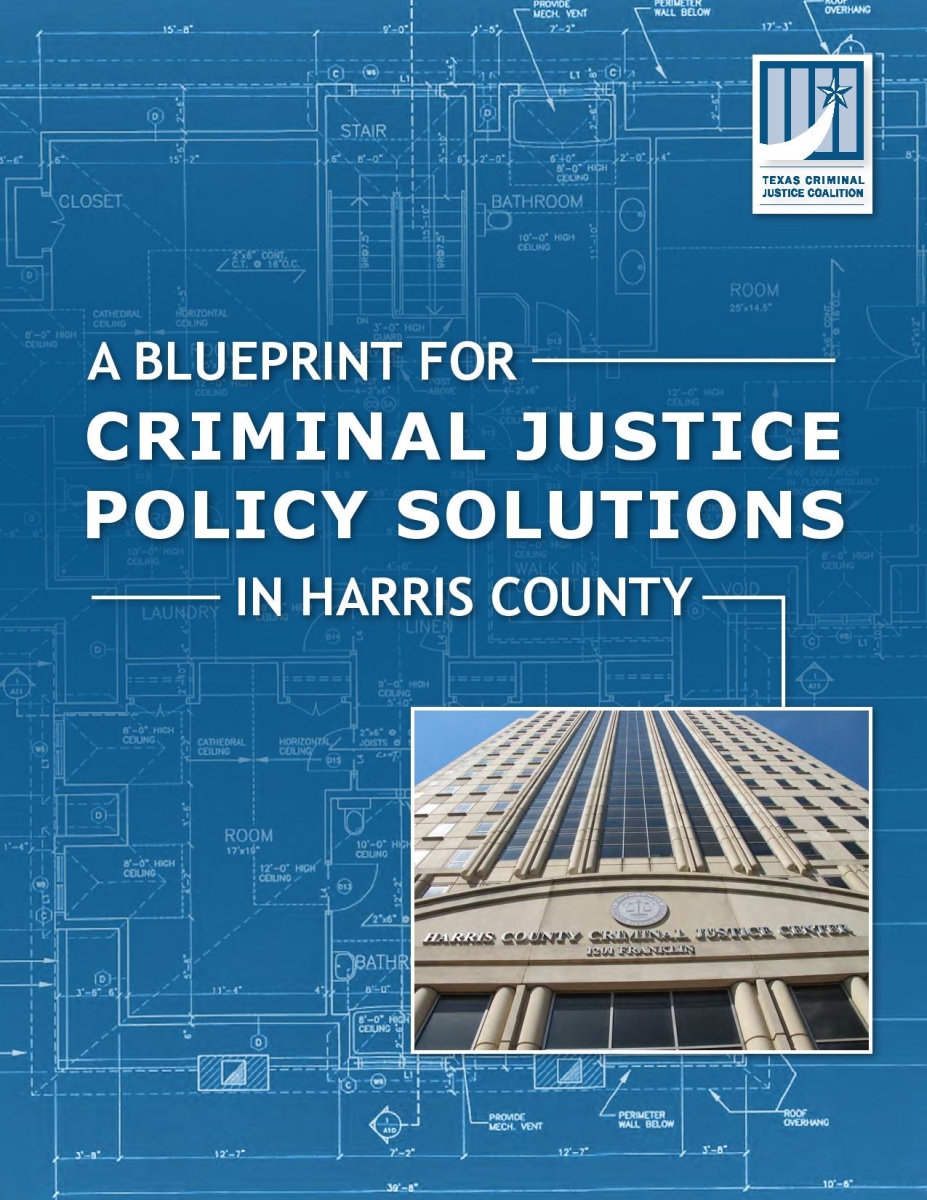
PEACEMAKER AWARD: In late 2015, TCJC is recognized as a Local Honoree for the Peacemaker Award, annually presented by the Houston Peach & Justice Center to local Houston leaders and national voices for peace and justice.

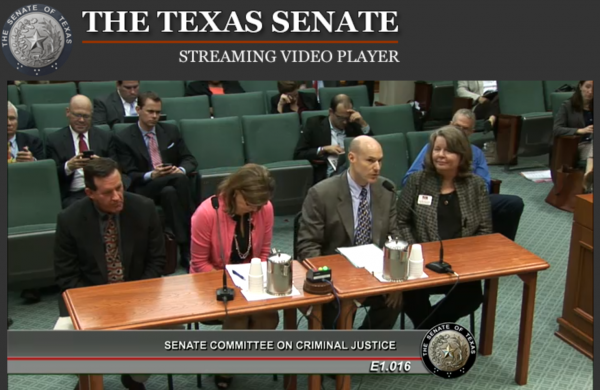
2014-2015: Major Legislative Successes & Resources for System-Impacted People
In 2014, TCJC unveils our Texas County Resources database, with community-based reentry and justice-related resources for every Texas county. Parole officers begin relying on this database to help people on parole find resources in their communities.
Read more
2014-2015: Major Legislative Successes & Resources for System-Impacted People
In 2014, TCJC unveils our Texas County Resources database, with community-based reentry and justice-related resources for every Texas county. Parole officers begin relying on this database to help people on parole find resources in their communities.
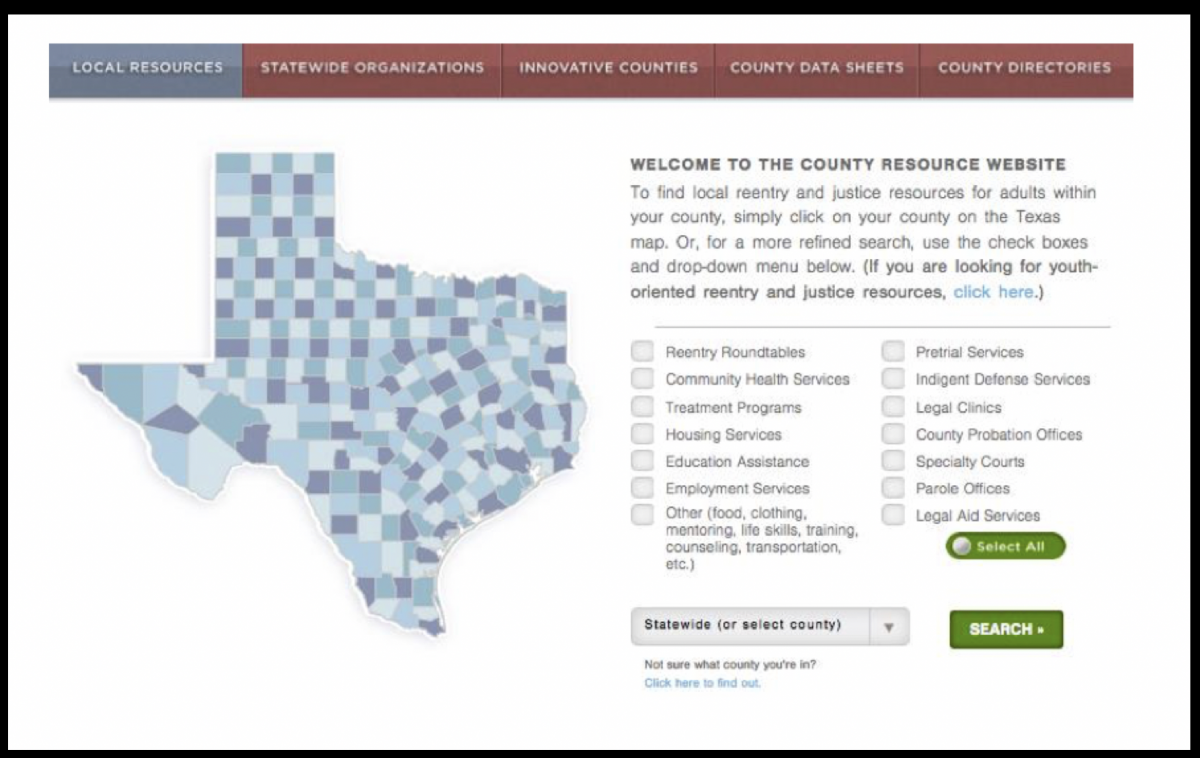
During Texas’ 2015 legislative session, TCJC helps fight for critical wins:
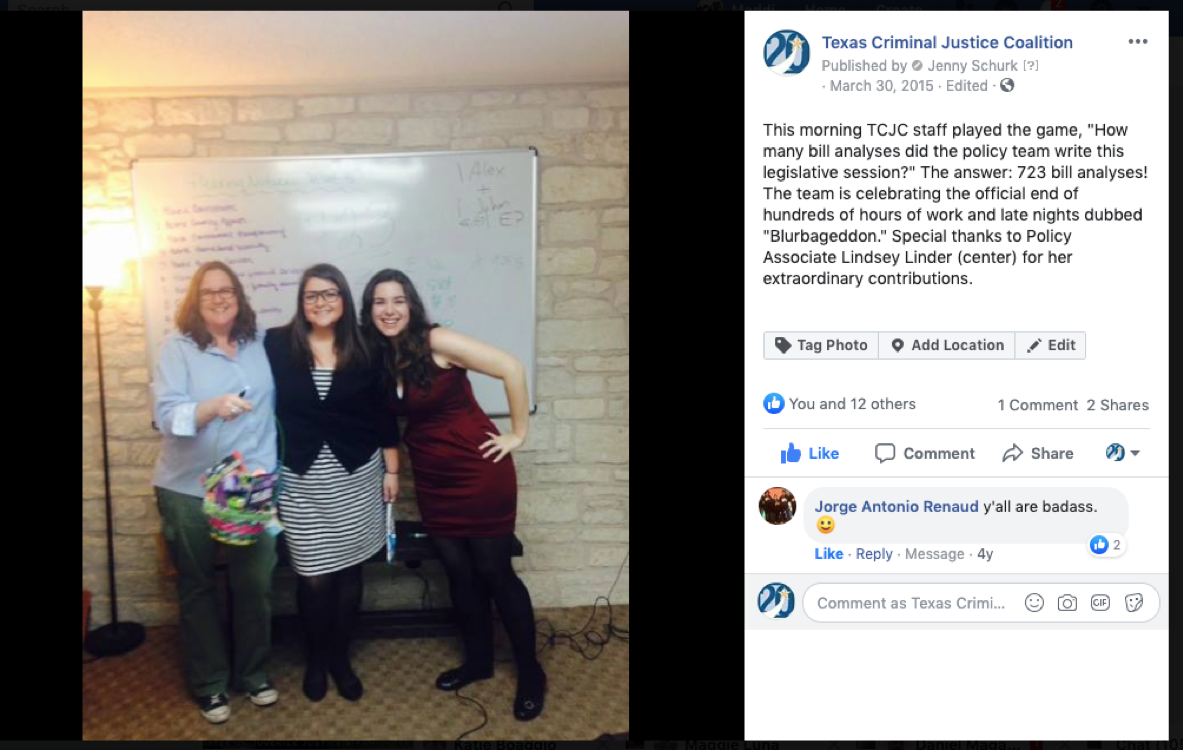
- For first time in 22 years, Texas updates monetary “thresholds” associated with property offense penalties to account for inflation, leading to thousands fewer people being admitted to state jails, and saving millions. Texas sets the highest felony thresholds for theft in the nation.
- TCJC fights to help people make a successful transition from incarceration to the community, including through a bill that improves people’s access to housing by protecting landlords from liability for leasing a dwelling to a tenant with a record. On behalf of the Texas Smart-On-Crime Coalition, TCJC creates two implementation guides related to the bill, one for housing providers and one for renters and advocates, which are downloaded over 4,000 times.
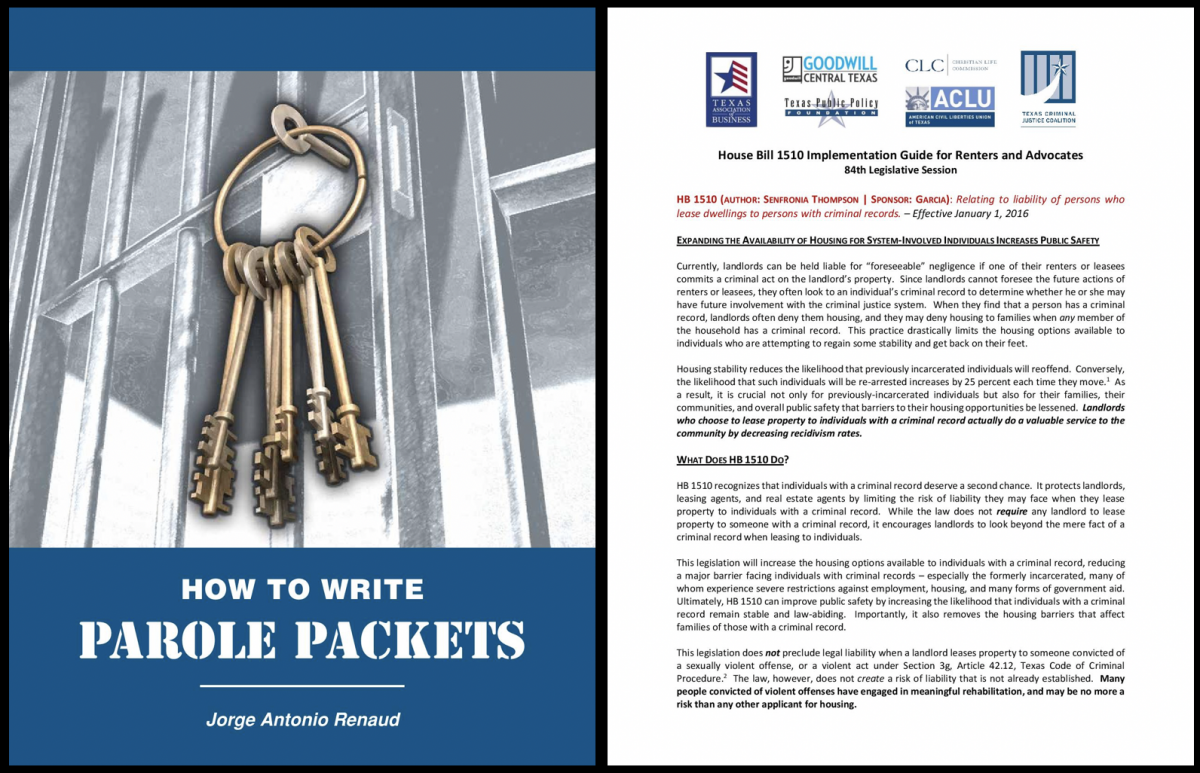
TCJC’s Jorge Renaud separately writes a comprehensive informational guide, How to Write Parole Packets, to send to people nearing their parole date. It has been downloaded more than 10,000 times.
- In the face of an effort to expand video-only visitation policies in Texas jails, TCJC and Grassroots Leadership co-publish a report critical of the commercialization of visitation, sparking broad interest in preserving face-to-face visitation. Ultimately, the Legislature restricts video visitation to facilities that had already made significant efforts to implement it.
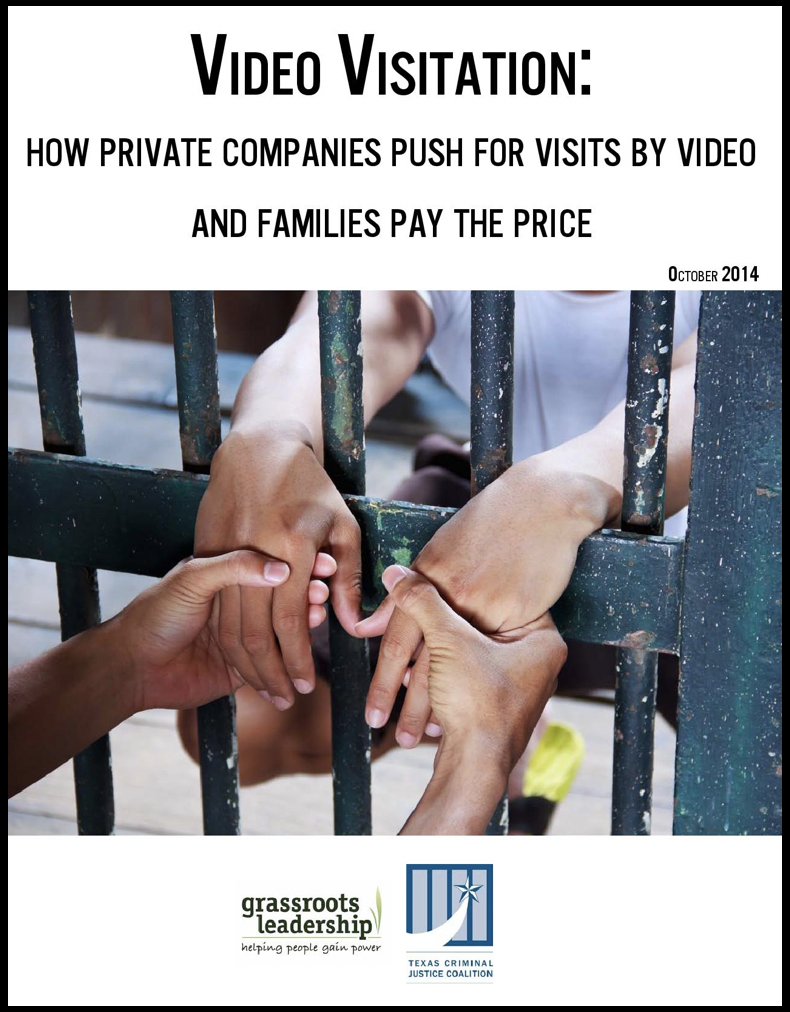
- The Legislature approves advocates’ recommendation to improve the awarding of “diligent participation” credits for program completion inside state jails, potentially impacting thousands of people per year depending on program availability.
- TCJC joins other advocates in creating the Substance Use Disorder (SUD) Coalition, whose priorities include sentencing reform, treatment vs. incarceration, and reducing technical probation revocations. Advocates are pleased that the Legislature makes a $150 million increase in appropriations to bolster Texas’ mental health system, including funding for mental health and substance abuse services for incarcerated individuals.
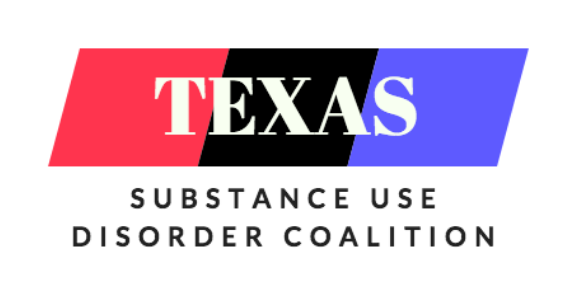
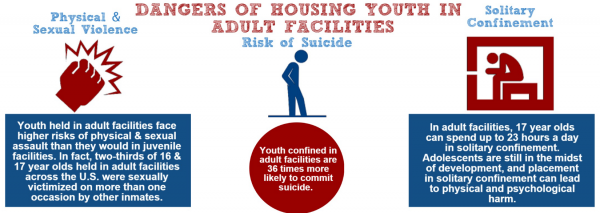
2014-2019: Fighting to Raise the Age
In March 2014, TCJC is invited to present testimony at a House Criminal Jurisprudence Committee interim hearing on the classification of 17-year-olds as adults in Texas’ justice system. We begin working with the Campaign for Youth Justice to ensure we make the strongest case for raising the age t...Read more
2014-2019: Fighting to Raise the Age
In March 2014, TCJC is invited to present testimony at a House Criminal Jurisprudence Committee interim hearing on the classification of 17-year-olds as adults in Texas’ justice system. We begin working with the Campaign for Youth Justice to ensure we make the strongest case for raising the age to 18.
After hearing that 2015 legislation might wrap the juvenile system into Texas’ adult corrections system, TCJC and our partners maintain our fight for a “raise the age” policy. We find allies in the faith community in key legislative districts, the Sheriffs’ Association of Texas, the business community, and others. While legislation is unsuccessful, we keep attention on the issue by authoring a piece for the Juvenile Law Section of the Texas State Bar on “raising the age”; it is featured in their 2015 Special Legislative Issue in August 2015.
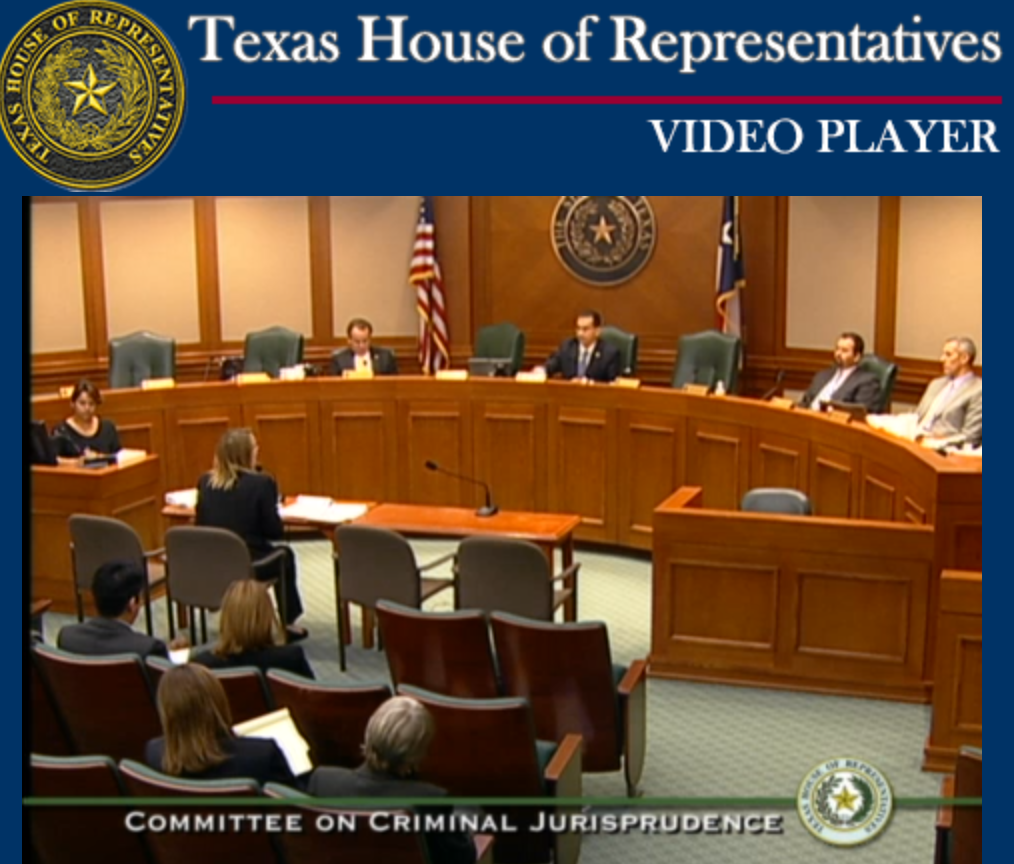
In early 2016, we present on How to Keep Kids Out of Adult Jails and Prisons at the Texas Conference of Urban Counties’ annual policy conference, among other things emphasizing a raise in the age of criminal responsibility from 17 to 18.
In 2017, TCJC and our advocate partners host approximately 150 students and teachers at the Texas State Capitol for Raise the Age Day. At the time, Texas is one of only five states that automatically treats 17-year-olds as adults in the justice system.
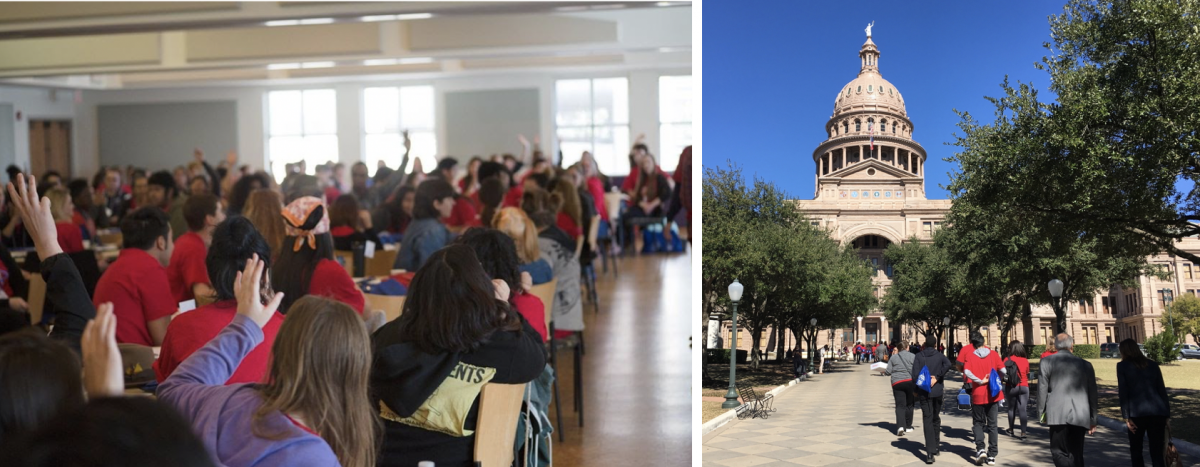
On behalf of various partner organizations, TCJC also develops and launches RaiseTheAgeTX.org, helping educate people about the measure and featuring news and personal stories. We also partner on a widely disseminated info-graphic. While a “raise the age” bill passes the House of Representatives in 2017, it does not get a hearing in the Senate.
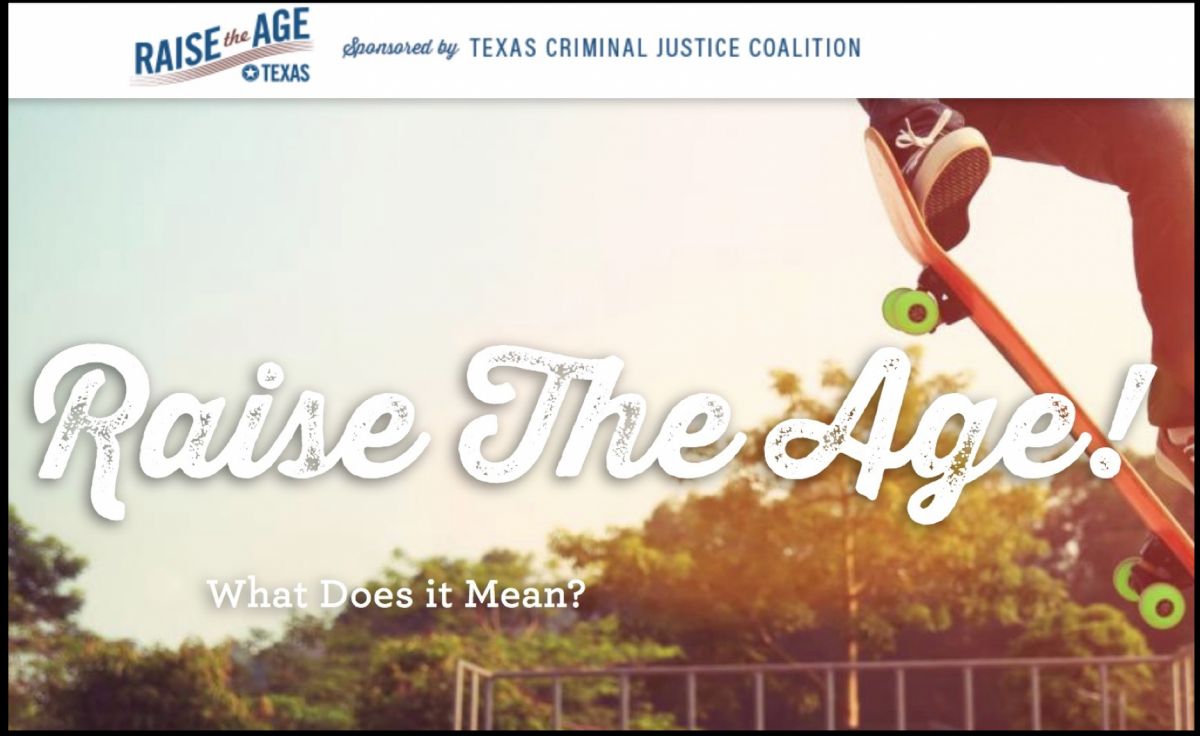
In 2018 and 2019, we continue to build support for the measure, and it is added to the Texas Republican party platform [#111], reflecting strong bipartisan support. But after a “raise the age” bill again fails to advance in 2019, we release a report featuring profiles of 11 individuals personally impacted by Texas’ approach to 17-year-olds. To bring the report to life, we create visual profiles of these individuals and hang the profiles gallery-style in the Texas Capitol Building. We also host an ice cream social at the Capitol with members of the Texas Smart-On-Crime Coalition and people featured in the gallery profiles.
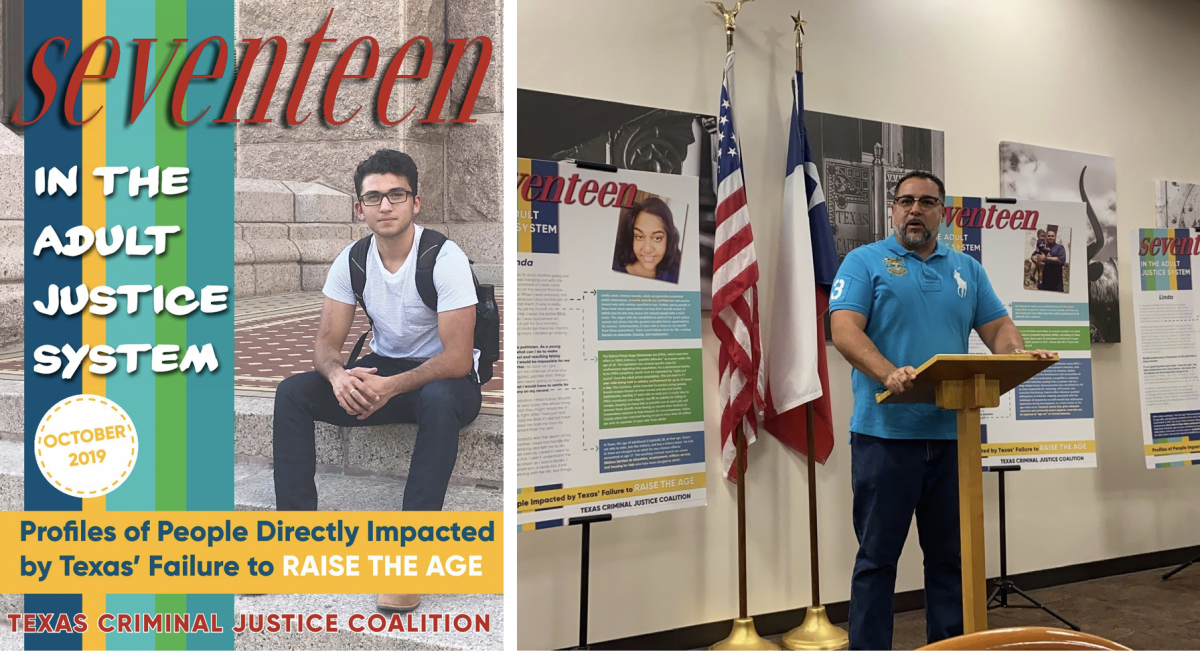
Currently, Texas is one of three states that has not passed a “raise the age” measure, alongside Georgia and Wisconsin.
Read less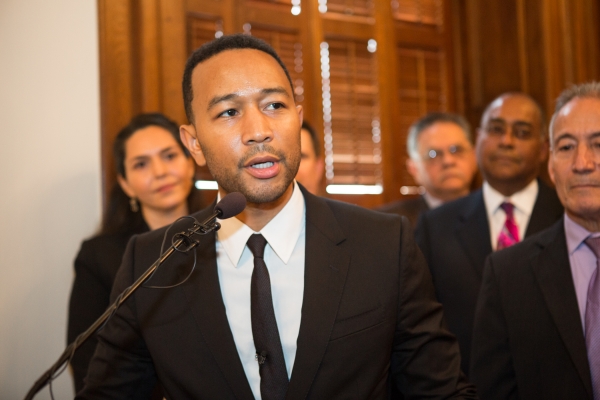
2015: Event with John Legend
John Legend launches a #FREEAMERICA campaign in April to end mass incarceration, and he visits Austin as the first stop on his listening and learning tour. TCJC assists him with remarks at a press conference at the Texas Capitol on needed system reforms, ...Read more
2015: Event with John Legend
John Legend launches a #FREEAMERICA campaign in April to end mass incarceration, and he visits Austin as the first stop on his listening and learning tour. TCJC assists him with remarks at a press conference at the Texas Capitol on needed system reforms, specifically pertaining to over-criminalization and effective alternatives to confinement, and transparency and accountability throughout Texas’ corrections systems. Mr. Legend refers to TCJC as “one of the nation’s preeminent smart justice organizations” and “at the forefront of this fight” for reform.
Read less
2015: New Executive Director
The TCJC Board unanimously appoints Leah Pinney to become TCJC’s new Executive Director. Leah has been with the organization for eight years in various roles – both as an advocate, pushing for stronger oversight at the Texas Youth Commission and advancing the rights of indigent defendants, and serving as Finance and Operations Di...Read more
2015: New Executive Director
The TCJC Board unanimously appoints Leah Pinney to become TCJC’s new Executive Director. Leah has been with the organization for eight years in various roles – both as an advocate, pushing for stronger oversight at the Texas Youth Commission and advancing the rights of indigent defendants, and serving as Finance and Operations Director, overseeing TCJC’s organizational development and resource management.
TCJC’s new management team also includes Molly Totman as Deputy Director. Molly joined TCJC in 2004, serving as a project director on public safety issues, and more recently as the organization’s grants manager and senior editor.
Ana Yáñez-Correa leaves TCJC to lead the Criminal Justice program at the Washington, DC-based Public Welfare Foundation.
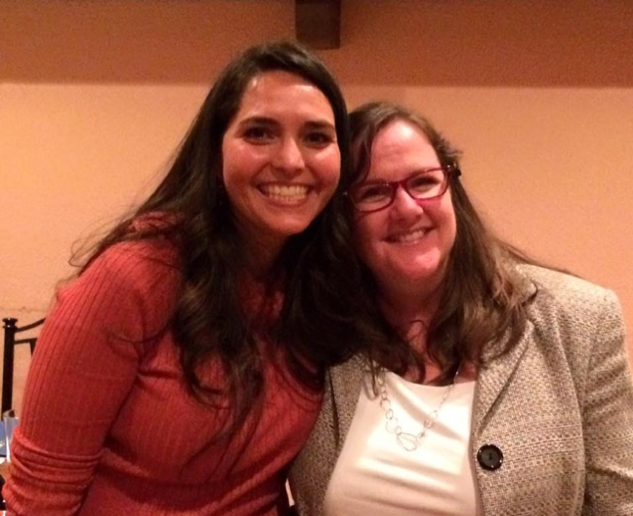
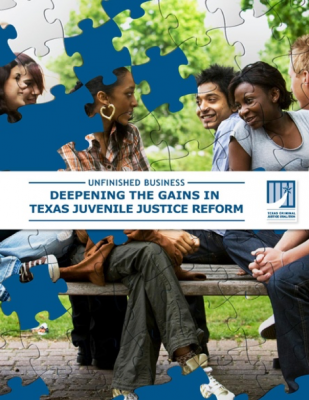
2015-2016: Decentralization of Texas’ Youth Justice System
In 2015, TCJC releases a policy paper, Unfinished Business: Deepening the Gains in Texas Juvenile Justice Reform. This paper is a follow-up to a comprehensive report by the Council of State Governments Justice Center on reforms in Texas’ juvenile system. TCJC’s report emphasizes the nee...Read more
2015-2016: Decentralization of Texas’ Youth Justice System
In 2015, TCJC releases a policy paper, Unfinished Business: Deepening the Gains in Texas Juvenile Justice Reform. This paper is a follow-up to a comprehensive report by the Council of State Governments Justice Center on reforms in Texas’ juvenile system. TCJC’s report emphasizes the need for improved juvenile facility oversight, additional support for probation departments so more youth can be served in their communities, and a raise in the age of juvenile jurisdiction from 17 to 18.
Legislators in 2015 decentralize the juvenile justice system, which keeps nearly 200 kids closer to home in local facilities in lieu of commitment to remote youth prisons. The legislation also prohibits the use of empty adult facilities to house youth locally, expands the Independent Ombudsman’s jurisdiction to 35 local post-adjudication facilities (where nearly 3,500 youth are held), and requires local juvenile probation departments to use validated risk and needs assessments.
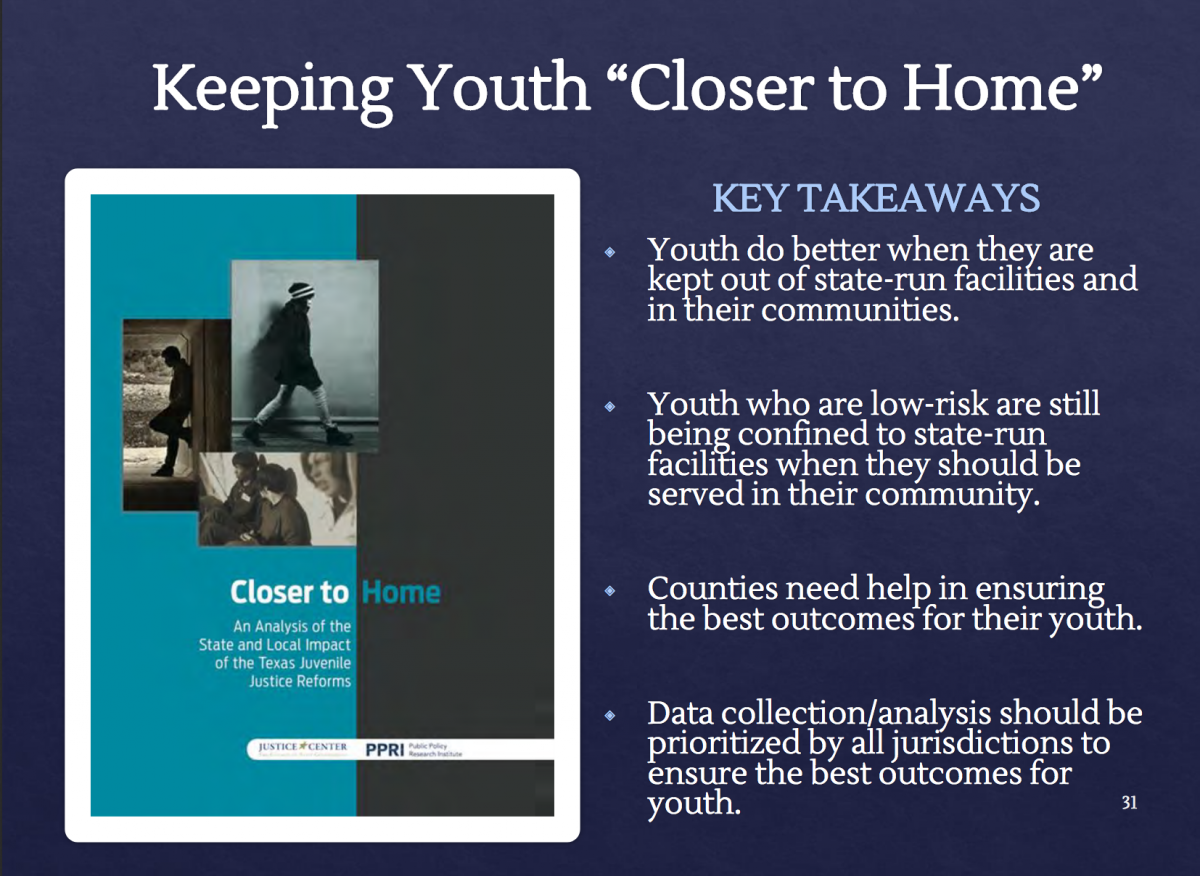
In 2016, the Texas Juvenile Justice Department (TJJD) invites TCJC to present a webinar to help practitioners consider treatment needs, research-based programs and practices, out-of-home placements, county collaboration, and positive outcomes for youth. This is especially timely, falling directly prior to TJJD formally adopting its regionalization plan to move counties toward expanded or improved local treatment options and create additional research-based programs.
Read less
2016-2017: Deeper County-Level Advocacy
AUSTIN / TRAVIS COUNTY
TCJC staff begin making inroads in local Austin advocacy, joining other advocates in calling on local leaders to invest in community-based programs and prioritize pretrial reform to reduce the local jail population ...Read more
2016-2017: Deeper County-Level Advocacy
AUSTIN / TRAVIS COUNTY
TCJC staff begin making inroads in local Austin advocacy, joining other advocates in calling on local leaders to invest in community-based programs and prioritize pretrial reform to reduce the local jail population and racial disparities in incarcerated populations.
Advocates also formalized a group, called DecarcerateATX, to continue to make demands regarding Travis County’s over-incarceration and racial discrimination. TCJC sits on the policy committee.
HOUSTON / HARRIS COUNTY
TCJC is actively involved in the application process for a MacArthur Foundation Safety + Justice Challenge grant. The county is awarded both a planning grant and a grant of $2 million over three years to implement strategies that will reduce its average daily jail population.
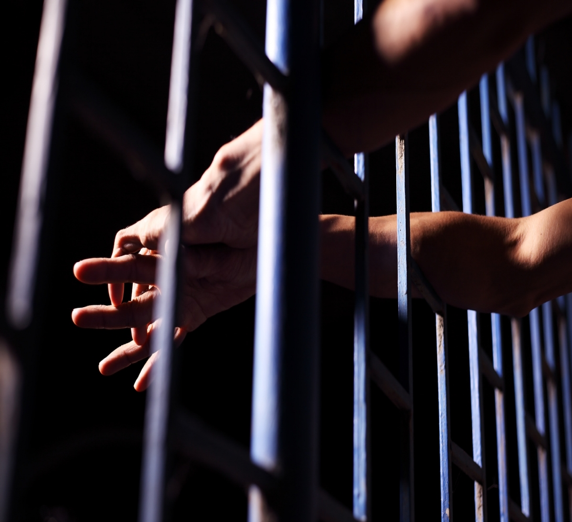
TCJC is supportive of the federal civil lawsuit filed against Harris County in 2016 for its unjust bail schedule. We provide the Civil Rights Corps (then called Equal Justice Under Law) with data and other intelligence-gathering on the ground.
Note: The lawsuit, which is formally settled in late 2019, increases access to personal bonds for approximately 85% of misdemeanor defendants. Jay Jenkins, TCJC’s Harris County Project Attorney, is now serving on the Community Working Group that is advising the federal monitor overseeing
Read less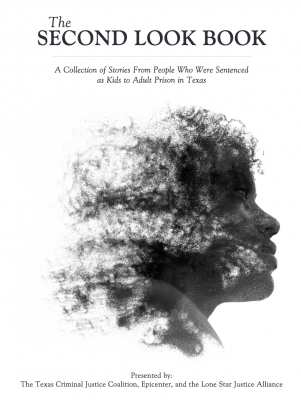
2016-2017: Advocacy Around Kids Impacted by the Justice System
SECOND LOOK: After a series of U.S. Supreme Court cases, states were required to eliminate mandatory life without parole sentences for youth under 18 years of age. Texas now requires people who would have received that sentence to instead serve 40 years before becoming parole-eligible, a de facto life sentence that provides no reasonable opportunity to build a life outsi...Read more
2016-2017: Advocacy Around Kids Impacted by the Justice System
SECOND LOOK: After a series of U.S. Supreme Court cases, states were required to eliminate mandatory life without parole sentences for youth under 18 years of age. Texas now requires people who would have received that sentence to instead serve 40 years before becoming parole-eligible, a de facto life sentence that provides no reasonable opportunity to build a life outside of prison.
In 2016, TCJC co-hosts a three-day “ to discuss the issue and needed reforms, and we release The Second Look Book, the first-ever collection of stories from people who were sentenced as kids to an adult prison in Texas, which helps us put a real face on the issue.
During Texas’ 2017 legislative session, TCJC recruits family members of victims to testify and conducts a comprehensive data analysis showing the potential cost savings associated with a Second Look bill. While the bill passes out of committee, it stalls after that point.

Jeremy Gartrell, sentenced to 50 years at 16 years old
JUVENILE RECORD SEALING: In 2015, policy-makers created an advisory committee to examine best practices surrounding juvenile record sealing and retention.
Throughout 2016, TCJC holds a slot on the advisory committee and participates in writing the committee’s report of final recommendations, as well as drafting legislation for consideration in 2017.
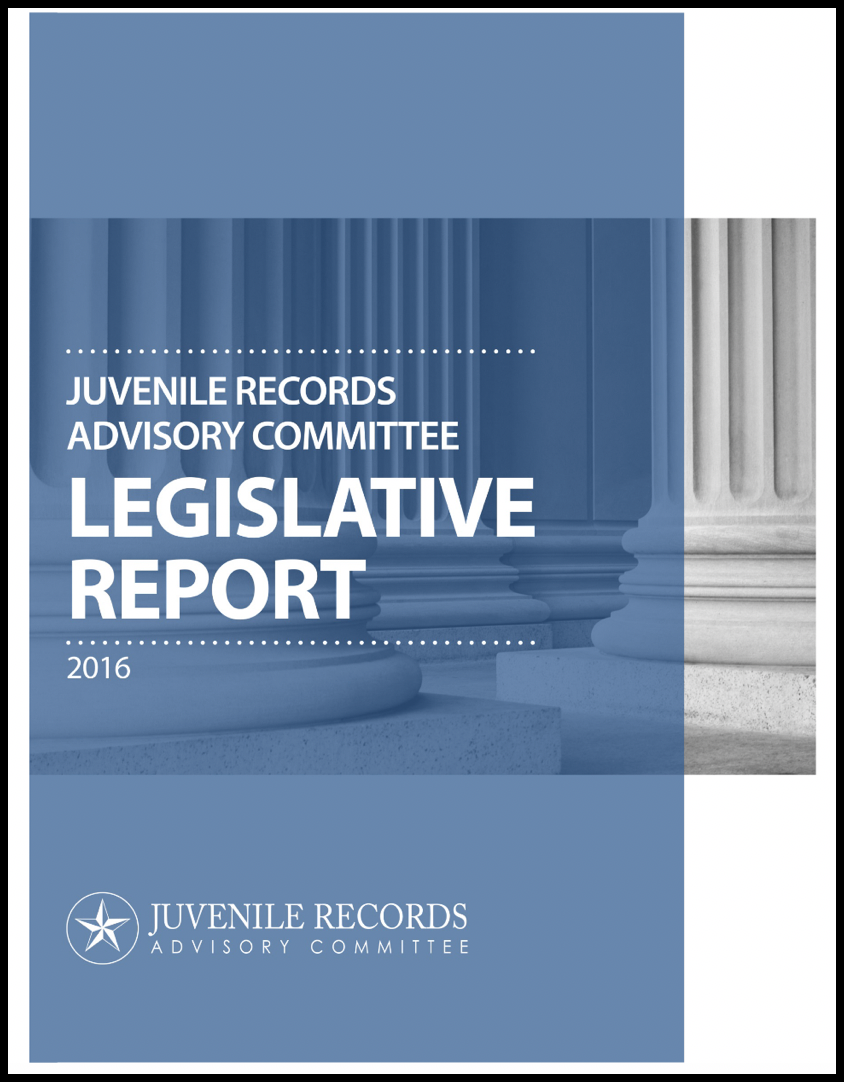
That legislation successfully passes, requiring automatic record sealing in various circumstances.
Read less
2017: Additional Adult Facility Closures as Decarceration Reforms Make Impact
LEGISLATIVE WINS: During Texas’ 2017 legislative session, lawmakers largely deprioritize criminal justice reform, despite advocates’ strong push to continue safe reductions in incarceration.
As part of our advocacy, TCJC and our Smart-On-Crime partners host Read more
2017: Additional Adult Facility Closures as Decarceration Reforms Make Impact
LEGISLATIVE WINS: During Texas’ 2017 legislative session, lawmakers largely deprioritize criminal justice reform, despite advocates’ strong push to continue safe reductions in incarceration.
As part of our advocacy, TCJC and our Smart-On-Crime partners host Treatment First: A Day of Awareness, focusing on substance use disorder, public safety, and healthy communities. Practitioners, advocates, academics, and impacted individuals sharing their experiences and reform proposals.
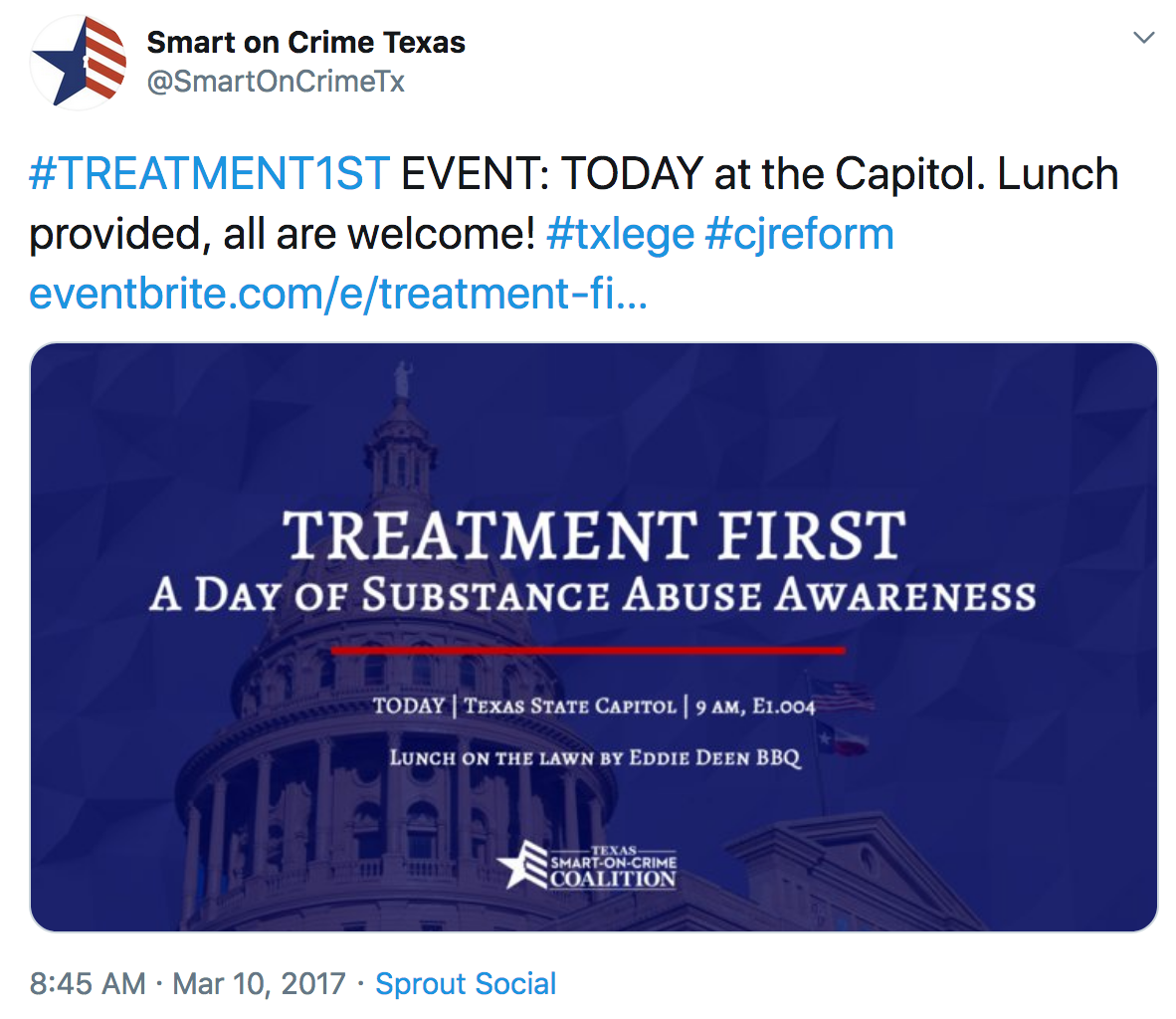
While advocates had hoped for more, successful bills will: require courts to consider the results of a risk assessment prior to setting probation conditions, intended to reduce revocations; increase the monetary thresholds for forgery, matching the levels for theft we had achieved during Texas’ 2015 session; allow probation departments to use state-funded treatment beds for pretrial diversion; authorize the creation of a pilot program to shorten state jail sentences and allow people early release into a community-based vocational/cognitive behavioral program; and allow academic credit and industry recognition for incarcerated individuals. Various bills will also widen expunction (here, here, and here), nondisclosure (hereand here), and judicial set-asides for certain offenses and in certain circumstances.
Furthermore, TCJC and our partners support the successful passage of the Sandra Bland Act. While it is missing the initial centerpiece of the bill (prohibiting arrests for non-jailable offenses), it does ultimately include de-escalation training for law enforcement, as well as potential diversion from jail into treatment for certain individuals suffering from mental health or substance abuse issues, and stronger data reporting and independent investigations into in-jail deaths.
FACILITY CLOSURES: Advocates are thrilled that the budget designates four more adult correctional facilities for closure, including the Ware Unit, the Bartlett State Jail, the West Texas Intermediate Sanction Facility, and the Bridgeport Pre-Parole Transfer Facility. This follows the closure of the South Texas Intermediate Sanction Facility in 2016. TCJC has testified for prison closures at agency budget hearings in 2016 and before legislative committees in 2017.
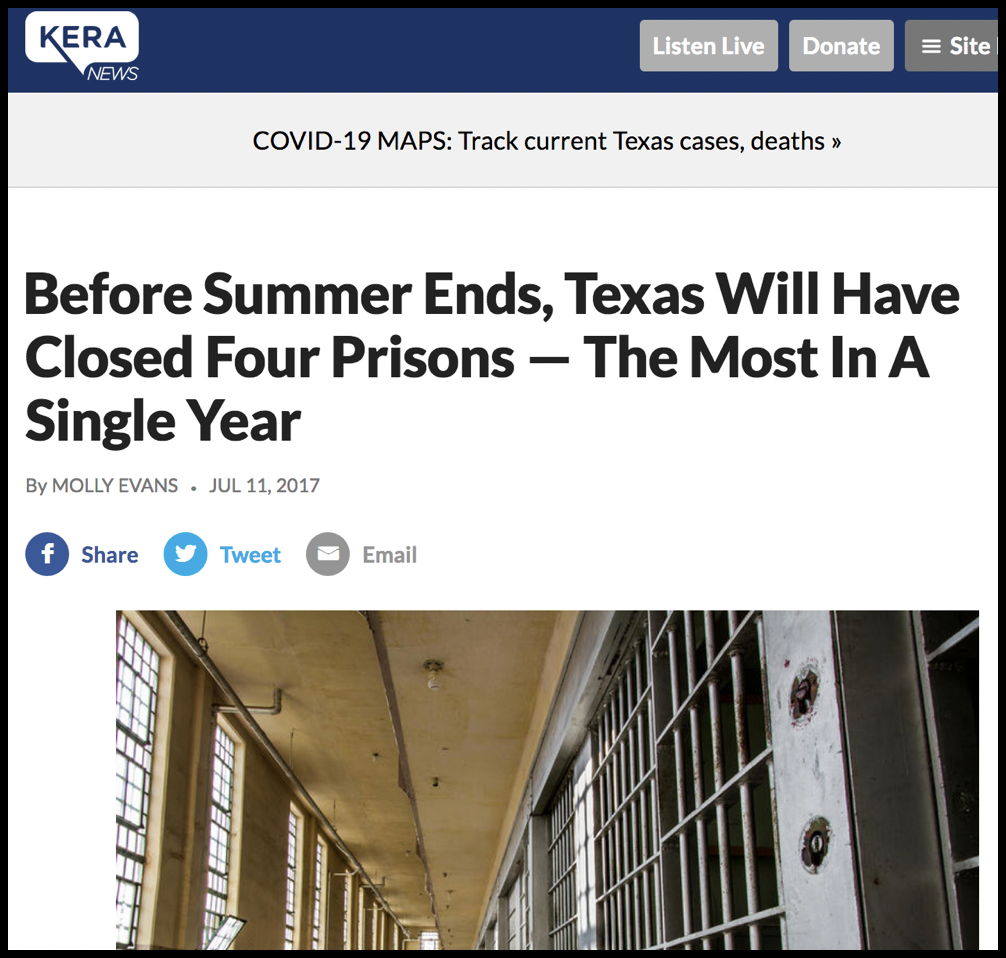
Texas’ crime rate has fallen 30 percent to a level not seen since late 1960’s, while the incarceration rate has fallen 20 percent.
Read less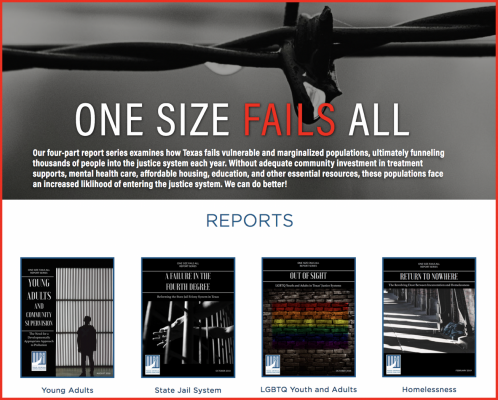
2018-2019: One-Size-FAILS-All Report Series
TCJC launches a four-part report series on vulnerable and marginalized populations in Texas’ justice system, specific to young people on adult felony probation, people cycling through state jails, system-involved LGBTQ individuals, and individuals who are homeless following release from confinement.
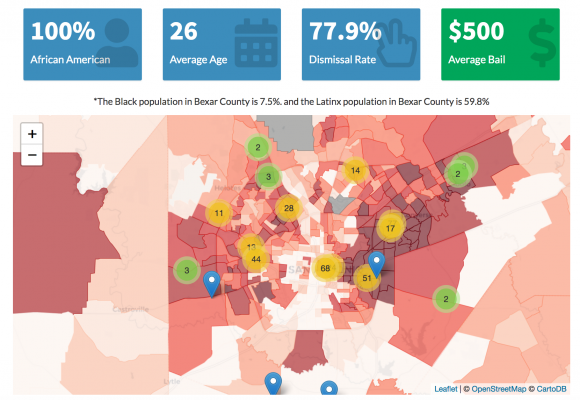
2018-2020: Advocacy in Houston Spanning Issues
DATA DASHBOARD: In 2018, TCJC works with January Advisors to develop a web-based dashboard that visually represents more than 800,000 criminal court dispositions in the county. It displays trends and outcome disparities, allowing users to see the degree to which arrests are skewed in low-income and neighborhoods of color; users also have a...Read more
2018-2020: Advocacy in Houston Spanning Issues
DATA DASHBOARD: In 2018, TCJC works with January Advisors to develop a web-based dashboard that visually represents more than 800,000 criminal court dispositions in the county. It displays trends and outcome disparities, allowing users to see the degree to which arrests are skewed in low-income and neighborhoods of color; users also have access to bail trends and individual judges’ sentencing decisions. This dashboard sparks reform conversations by providing the data to show where change is most needed.
SCHOOL-TO-PRISON PIPELINE: In 2018, we work with ONE Houston and the ACLU of Texas to release a report on school policing and host a “Teach-In” to get community input. We are currently working with area school districts, the District Attorney’s juvenile division, and the juvenile probation director to promote restorative strategies that keep kids in the classroom and on a productive path.
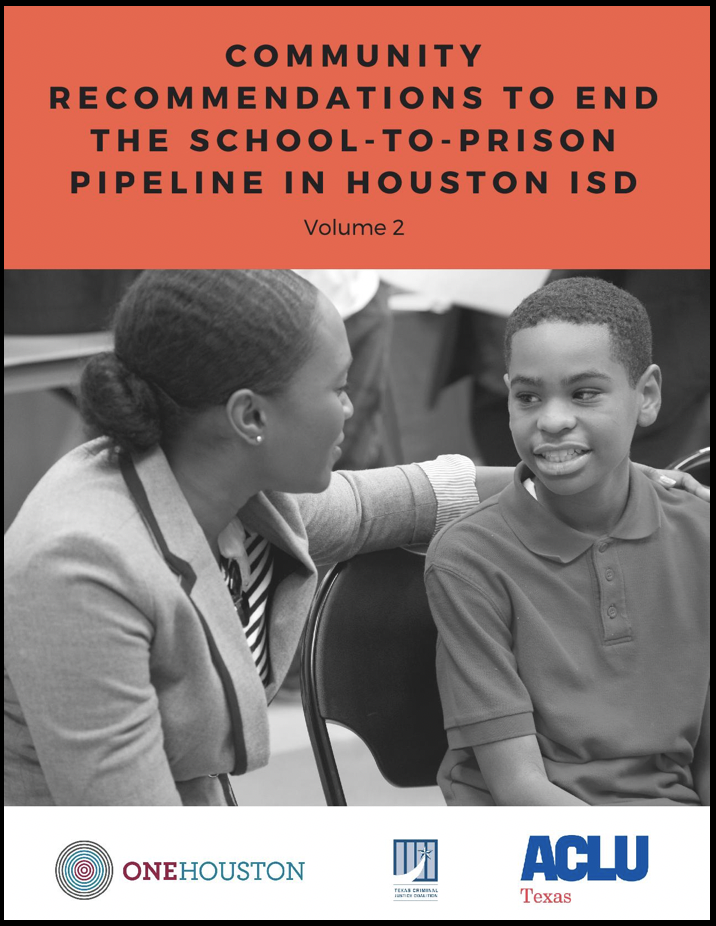
PROSECUTIONS: In 2019, TCJC and other advocates oppose the Harris County (Houston) District Attorney’s request for 102 new prosecutors, in part relying on data generated by TCJC’s Harris County dashboard. Ultimately, the Commissioners vote to reject the request.
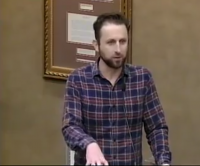
PRETRIAL ADVOCACY: In 2020, TCJC and the Texas Organizing Project begin issuing weekly pretrial reports to illustrate how Harris County’s felony judges are jailing thousands of people prior to trial simply because they cannot afford the money bail required for their release.
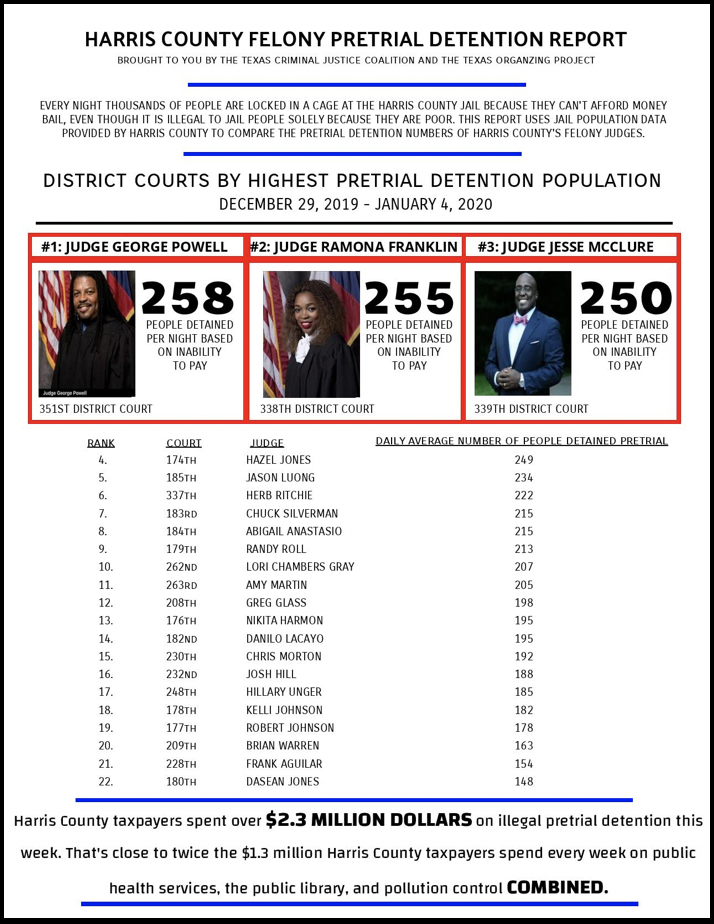
CONVICT LEASING: TCJC works with Reginald Moore (a local historian and former prison guard at the now-closed Central Unit in Sugar Land, Texas) to call attention to and memorialize the city’s use of leased convicts in the late 19th and early 20thcenturies – the bridge between slavery and mass incarceration. Following the 2018 discovery and excavation of 95 remains at that prison site, we have been advocating for proper reburial and memorialization of the bodies.
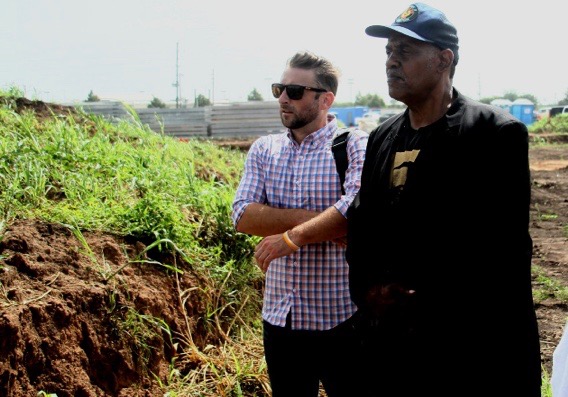
Photo credit: Michael Barajas, Texas Observer
Read less
2018-2020: TCJC Expansion to Dallas
In 2018, TCJC supports attorneys’ efforts to file a federal civil rights lawsuit against Dallas County, alleging that the county’s bail system unfairly harms low-income people by failing to consider a defendant’s ability to post bond.
TCJC also works with the Texas Orga...Read more
2018-2020: TCJC Expansion to Dallas
In 2018, TCJC supports attorneys’ efforts to file a federal civil rights lawsuit against Dallas County, alleging that the county’s bail system unfairly harms low-income people by failing to consider a defendant’s ability to post bond.
TCJC also works with the Texas Organizing Project (TOP) to expand its Right2Justice work to Dallas to conduct education and advocacy, including around the 2018 primary elections. TCJC works with TOP to finalize their full reform platform – including ending mass incarceration – and we seek support from District Attorney candidates.
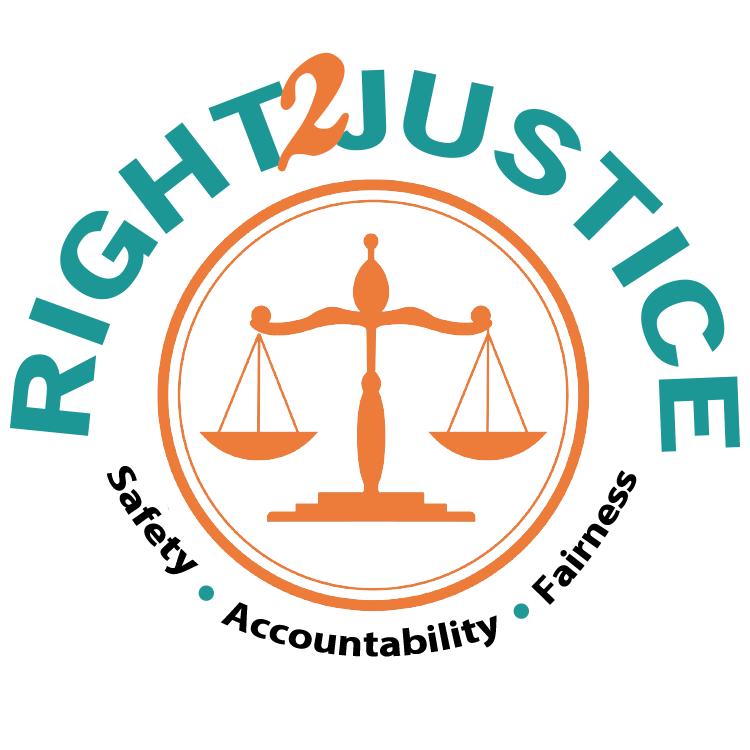
In 2019, TCJC formally expands to Dallas County, adding a full-time staff person and unveiling our Dallas County data dashboard, which visually represents nearly 115,000 criminal court dispositions in the county.
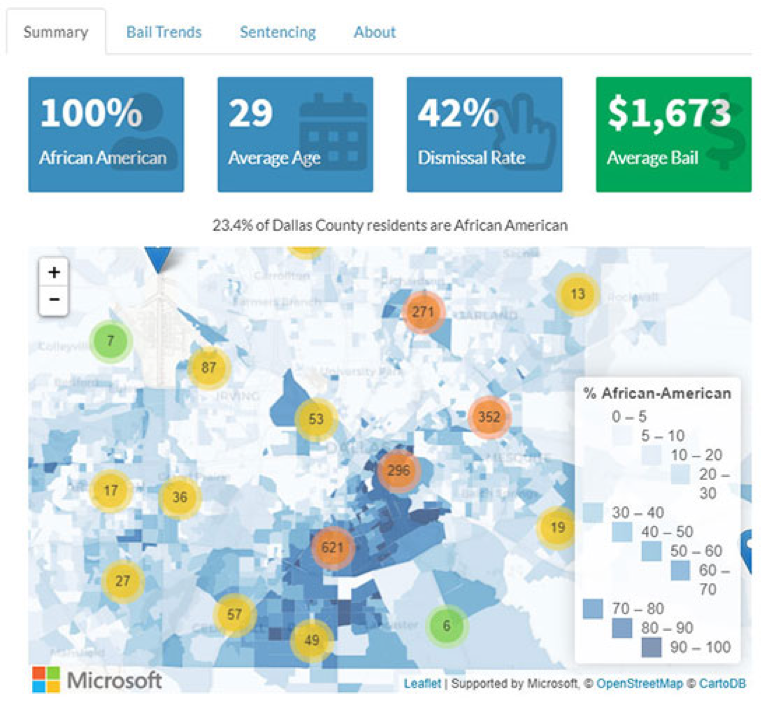
In 2020, TCJC launches the Perception Equals Potential (P.E.P.) campaign to identify and advance community-based solutions to reverse the school-to-prison pipeline in Dallas County. We are advocating for restorative programming that keeps students in the classroom and on a productive path.
Read less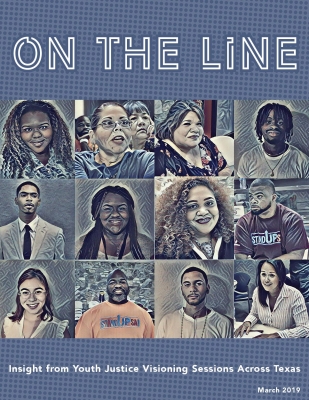
2018-2020: Ongoing Youth Justice Advocacy
VISIONING SESSIONS: In 2018, TCJC works with the Campaign for Youth Justice and Youth First to plan a series of “visioning sessions” in four major urban areas in Texas, where we convene directly impacted youth and family members to tell their stories and share their insights about youth-related reform priorities. We release a Read more
2018-2020: Ongoing Youth Justice Advocacy
VISIONING SESSIONS: In 2018, TCJC works with the Campaign for Youth Justice and Youth First to plan a series of “visioning sessions” in four major urban areas in Texas, where we convene directly impacted youth and family members to tell their stories and share their insights about youth-related reform priorities. We release a report in 2019, which includes a collective set of community-driven solutions that surfaced during the visioning sessions – including raising the age of juvenile jurisdiction, building a more rehabilitative youth justice system, and reforming harsh sentencing for youth.
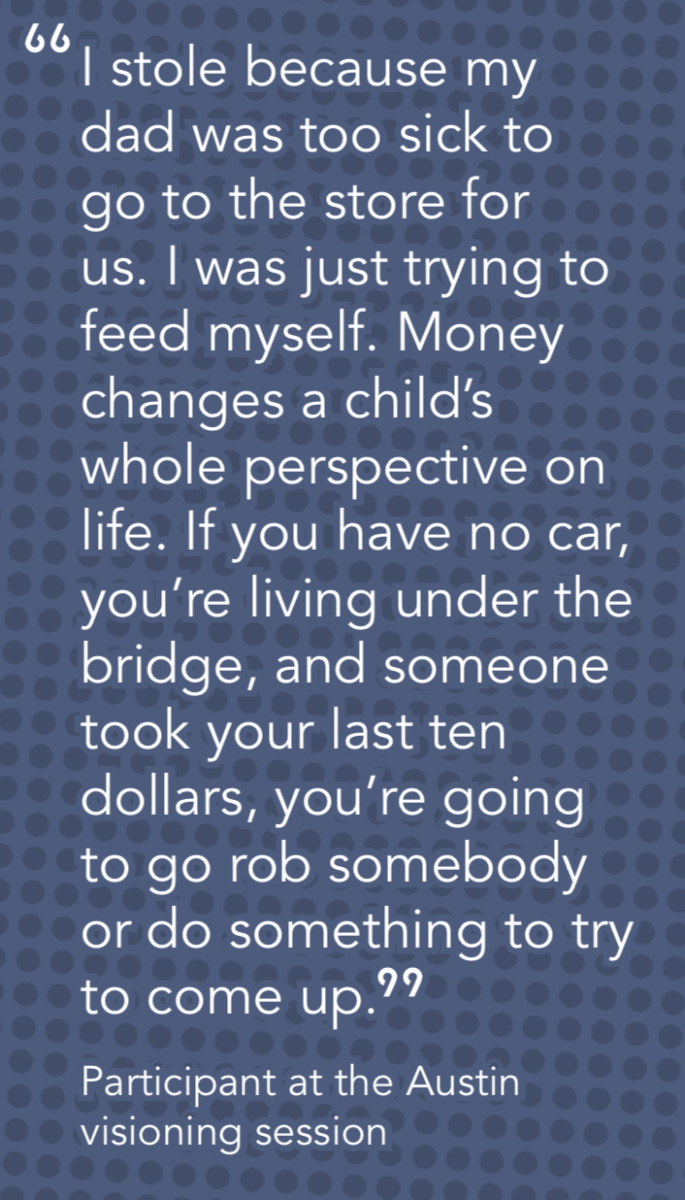
RESTORATIVE JUSTICE: In 2019, TCJC begins pushing for restorative justice strategies in Texas schools to reduce the school-to-prison pipeline. We release a report and Quick Guide in 2020 on needed restorative justice strategies (co-authored by TCJC’s first Youth Justice Ambassador, a Texas high school student). We also co-host a sold-out event in San Antonio with city and school district personnel to encourage wider implementation of restorative justice there, and we present before school district representatives in Harris County (Houston) on restorative strategies.

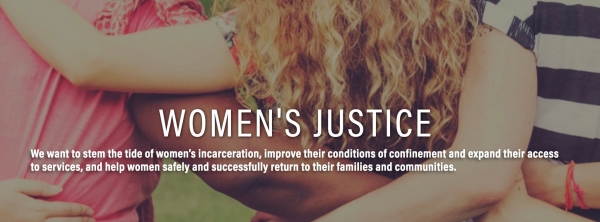
2018-2020: Successful Women’s Justice Campaign
TCJC launches our “Justice for Women” campaign in 2018, seeking to reduce the number of women entering the justice system, treat system-impacted women with dignity, and increase the likelihood that incarcerated women can successfully rejoin their families and communities.
We kick off the campaign with two landmark women’s justice reports; the Read more
2018-2020: Successful Women’s Justice Campaign
TCJC launches our “Justice for Women” campaign in 2018, seeking to reduce the number of women entering the justice system, treat system-impacted women with dignity, and increase the likelihood that incarcerated women can successfully rejoin their families and communities.
We kick off the campaign with two landmark women’s justice reports; the first explores the drivers of women into the justice system, and the second addresses the unique issues facing system-impacted women. Our recommendations are informed by findings from the largest-ever survey of women incarcerated in Texas prisons, previously conducted by TCJC.
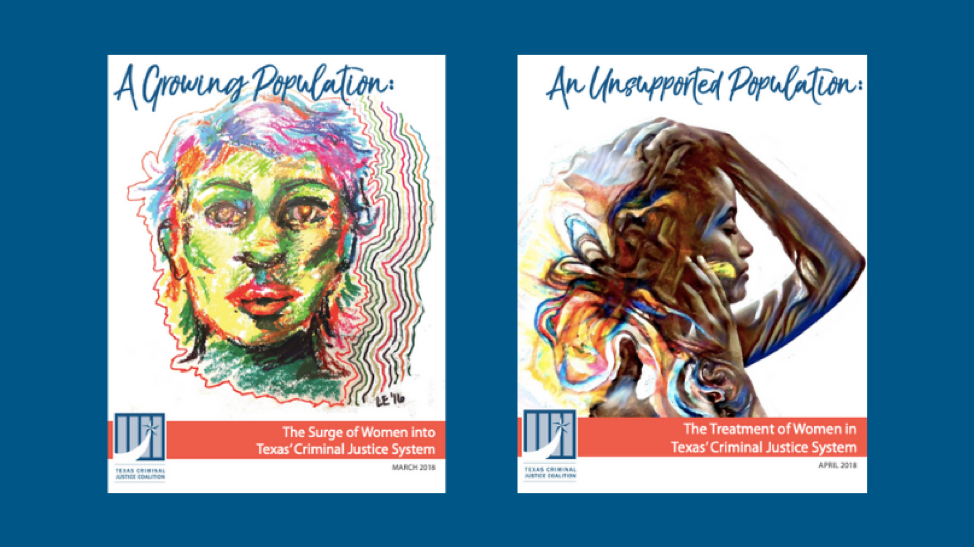
Together with partners, TCJC is a founding member of the Texas Women’s Justice Coalition, which brings together more than 60 advocates, service providers, and impacted women to fight for women’s dignity in the Texas justice system.
In mid-2018, TCJC co-hosts Women Unshackled with the Coalition for Public Safety. Nearly 200 attendees hear from keynotes Jenna Bush Hager and Kelley Paul, as well as speakers from around the country about the growth of women in prison and jail, their trauma and substance use, legislative solutions, and ways to support community programs that serve women. Note: We received permission to livestream the event into the Travis County Correctional Complex.

In 2019, we host a Women’s [In]Justice Day on International Women’s Day (March 8), which includes a march to the Capitol, a press conference at the Capitol Building with bill authors and impacted women from our Coalition, and legislative office visits.
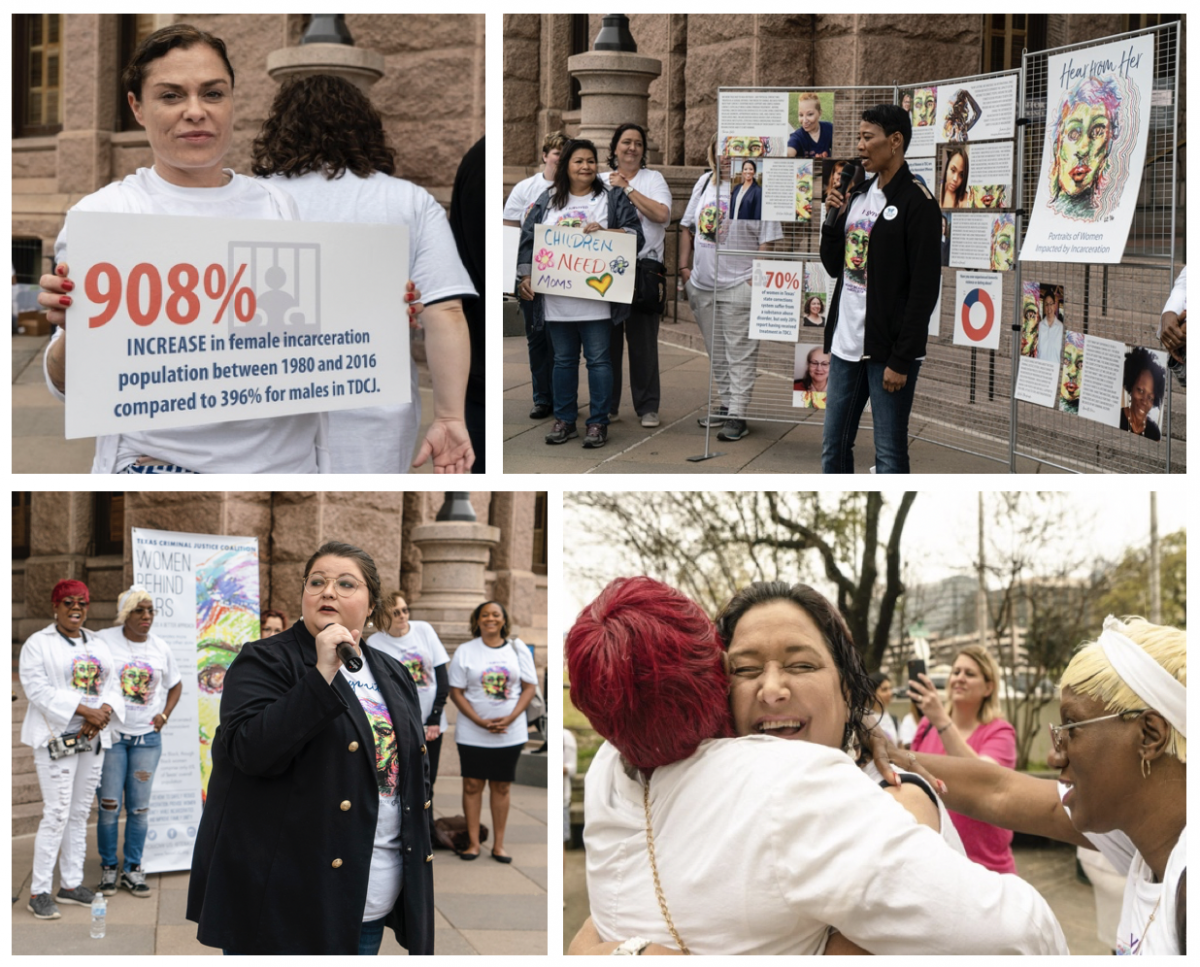
During Texas’ 2019 legislative session, our campaign is a resounding success, with eight bills signed into law that will provide greater access to in-prison programming for women, significantly lower heath care fees, improve the treatment of women in county jails, and address the needs of mothers with opioid use disorder.
Later in 2019, we host the first-ever Texas Women's Dignity Retreat, where over 60 system-impacted women and crime survivors plan the next steps in the Justice for Women campaign.

We release a report of our recommendations, as well as a video about the campaign, on International Women’s Day 2020.
Read less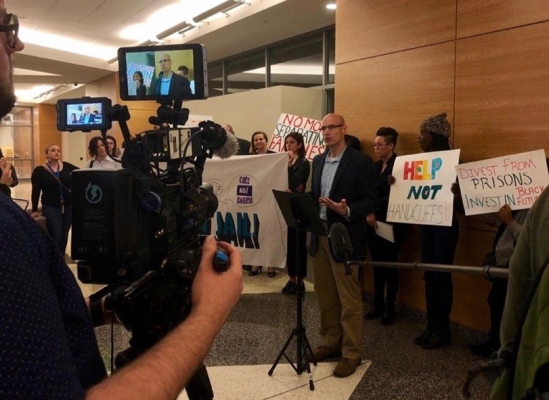
2018-2020: Fight for Decarceration in Austin
OPPOSITION TO WOMEN'S JAIL: In 2018, TCJC works alongside other advocates in Travis County (Austin) to oppose construction of a new women’s correctional facility, instead pushing for community-based investments in treatment and other alt...Read more
2018-2020: Fight for Decarceration in Austin
OPPOSITION TO WOMEN'S JAIL: In 2018, TCJC works alongside other advocates in Travis County (Austin) to oppose construction of a new women’s correctional facility, instead pushing for community-based investments in treatment and other alternatives to incarceration. Ultimately, the Commissioner’s Court agrees to pull the funding for jail construction and instead spend a year considering other opportunities to advance the health and safety of community members through diversion and treatment.
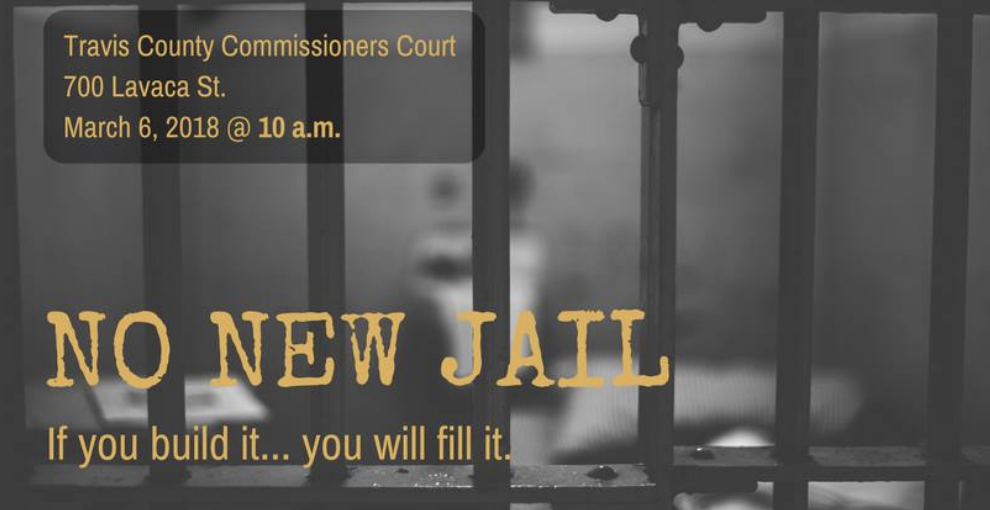
ADDRESSING SUBSTANCE USE: After spending a year analyzing Travis County (Austin) data on nearly 3,000 less-than-a-gram drug possession cases, TCJC and fellow advocates – Grassroots Leadership, the Texas Harm Reduction Alliance, and the University of Texas School of Law’s Civil Rights Clinic – jointly issue a report in 2020 calling for curtailed prosecution for personal-use drug possession, as well as a harm reduction approach to substance use. We also collectively hold community and DA candidate forums.
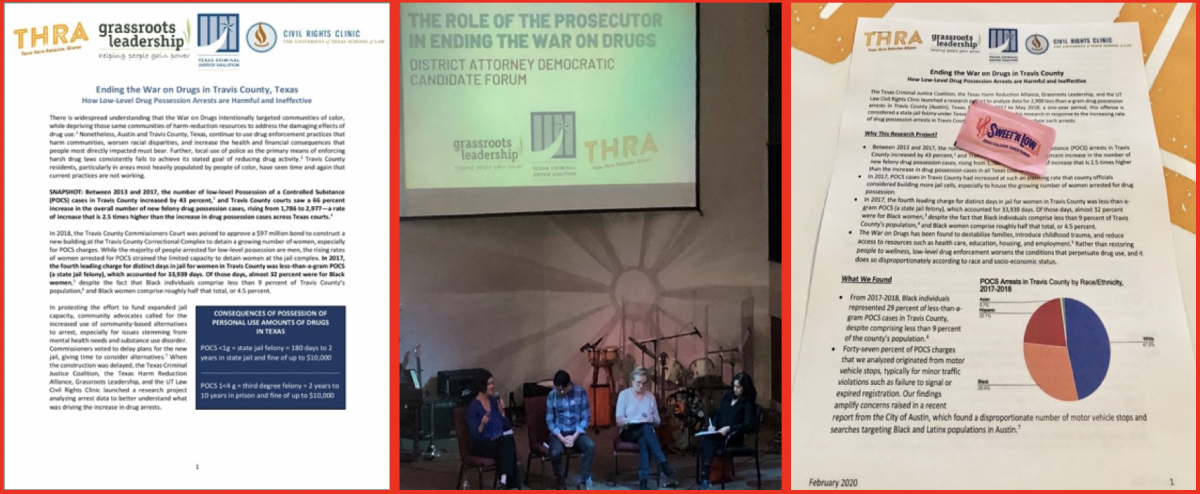
We remain engaged with local leadership and are advocating for non-prosecution and treatment for drug offenses, a complement to our larger statewide work to encourage a public health approach to substance use and behavioral health issues.
Read less
2019-2020: New Bills – and New Strategies to Reduce Incarceration
In 2019, TCJC’s policy team – which is comprised entirely of previously incarcerated individuals and crime survivors – successfully fights for bills and budget allocations that will: expand access to occupational licenses for people with a conviction; expand the use of Read more
2019-2020: New Bills – and New Strategies to Reduce Incarceration
In 2019, TCJC’s policy team – which is comprised entirely of previously incarcerated individuals and crime survivors – successfully fights for bills and budget allocations that will: expand access to occupational licenses for people with a conviction; expand the use of peer support in Texas prisons, which can lead to greater post-prison success rates; repeal the state’s failed Driver Responsibility Program (which TCJC had been fighting to abolish for over a decade); and help people involved in commercial sexual exploitation address their trauma and other behavioral health issues outside of the justice system.
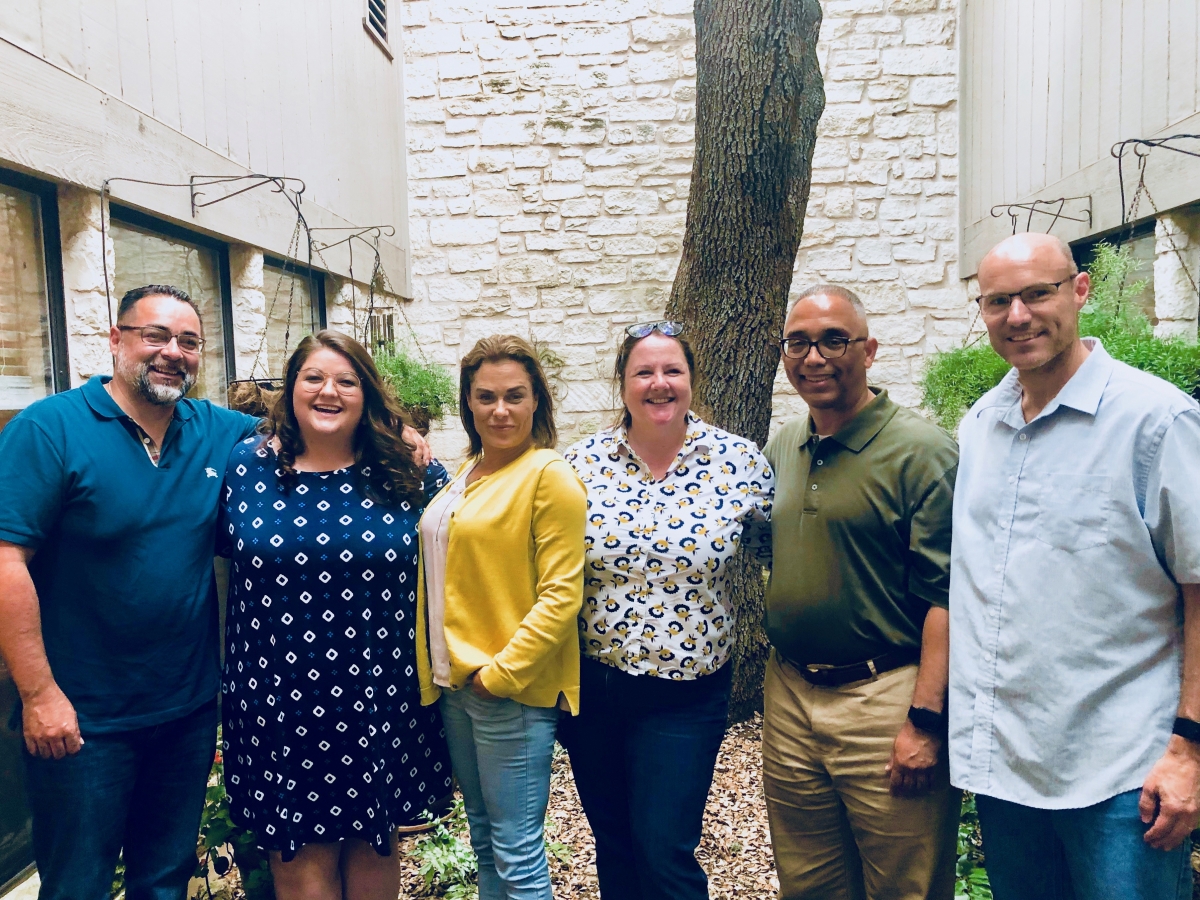
In 2020, in efforts to make deeper decarceration gains, TCJC establishes our new Statewide Leadership Council, a formerly incarcerated-led group committed to advancing reforms related to ending mass incarceration. Members are located throughout Texas, and they become critical in the decarceration fight as COVID-19 hits correctional facilities.

TCJC makes urgent demands of state and local leaders to reduce arrests and incarceration, and protect the rights and well-being of people who remain behind bars. Council members push for reforms in their local areas, as well as drive outreach to the Governor to take action.
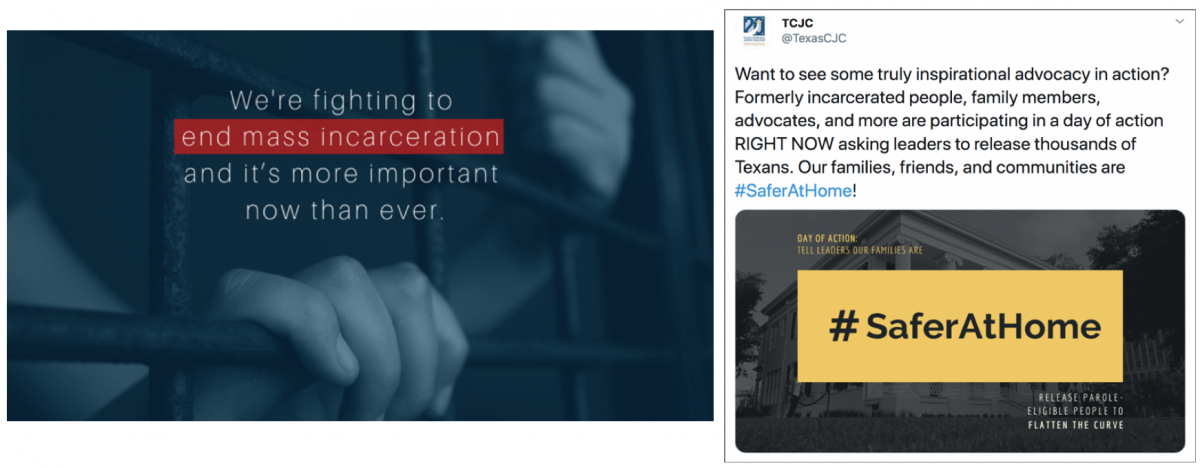

May 22, 2020: TCJC's 20th Anniversary
TCJC celebrates our 20th birthday! Over the past 20 years, our team has grown and changed – and taken up offices in other counties – and the organization has increased its emphasis on staff with lived experience in the justice system. But one thing hasn’t changed: Twenty years later, we are still hard at work to end mass incarceration and build safer, healthier Texas communities.
Over time, TCJC has h...Read more
May 22, 2020: TCJC's 20th Anniversary
TCJC celebrates our 20th birthday! Over the past 20 years, our team has grown and changed – and taken up offices in other counties – and the organization has increased its emphasis on staff with lived experience in the justice system. But one thing hasn’t changed: Twenty years later, we are still hard at work to end mass incarceration and build safer, healthier Texas communities.
Over time, TCJC has helped marshal support for more than 200 policies and budget riders that are improving the lives of thousands of Texans, while the state’s crime rate has fallen to its lowest level since the late 1960’s.
Altogether, decarceration measures have made it possible for the state to call for the shuttering of 10 adult corrections facilities since 2011 as 15,000 fewer people have entered prison. And nine youth facilities have been shuttered since 2007, with the number of kids incarcerated in the five remaining facilities dropping from 5,000 to less than 1,000 today.
Again, we thank our partners – as well as our donors, funders, and supporters – for making this all possible.

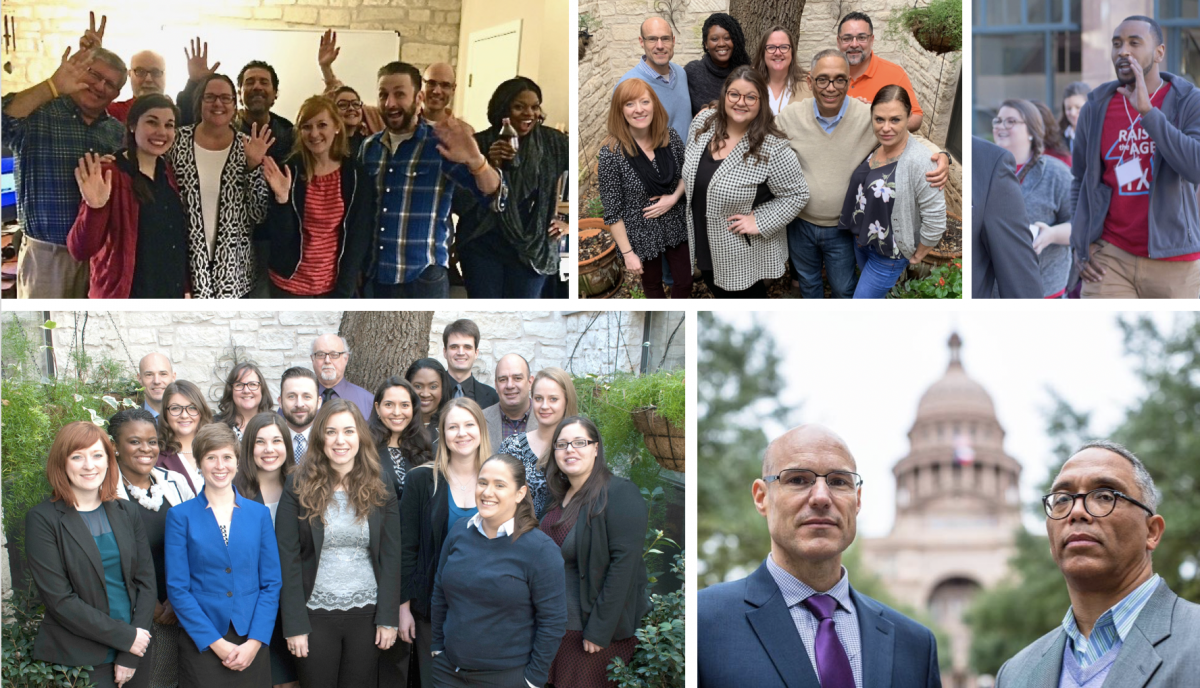

Read less